

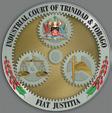

Industr Ial Court of trInIdad and tobago 1965 2015 50 Years of Social Justice Delivery ANNUAL REPORT 2014-2015
50 Years of Social Justice Delivery


1965
2015
Our MissiOn
We are an effective Court upholding the principles and practices of good industrial relations as pillars of industrial peace, economic and social development.
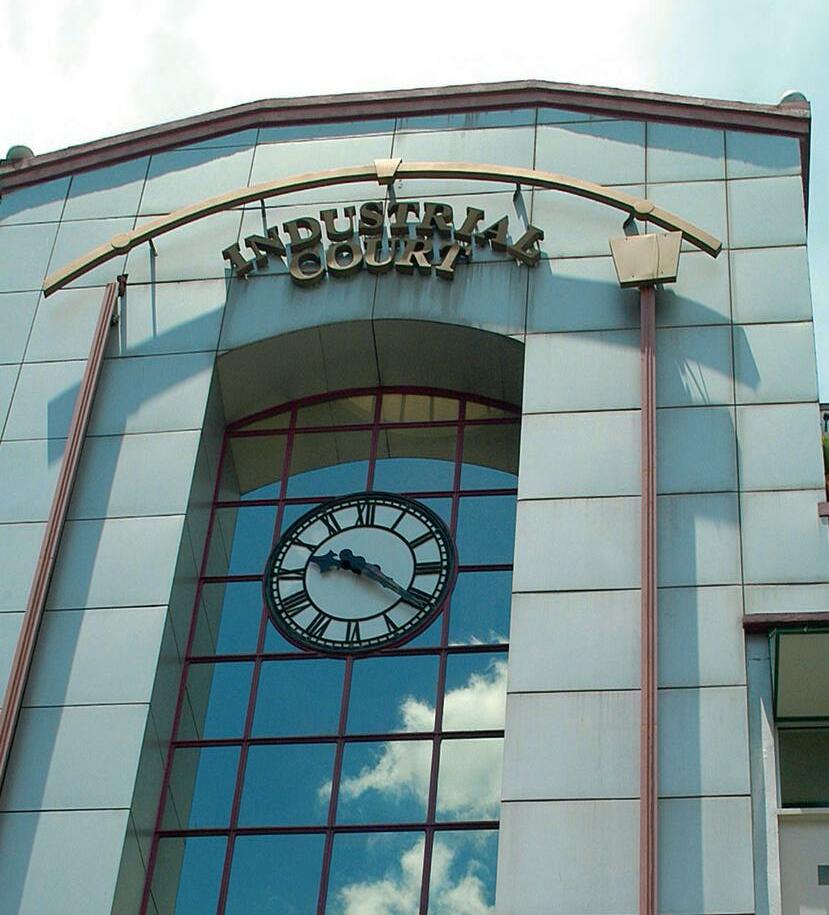
Our VisOn
To be an Industrial Relations Court established under the constitution which is fair, equitable and expeditious in dispensing social justice.

Our COre Values
• INTEGRITY
• EQUITY
• TEAMWORK
• JUSTICE
• RESPECT
• DISCIPLINE
• HONESTY
• ACCOUNTABILITY
• LOYALTY



2 / INDUSTRIAL COURT OF TRINIDAD AND TOBAGO LETTER TO THE MINISTER 3 FUNCTIONS OF THE COURT .................................................................................. 4 ORGANISATIONAL CHART 5 PRESIDENT’S MESSAGE 6–12 TRIBUTE ....................................................................................................................... 13 CONGRATULATIONS 14 50 YEARS AT A GLANCE – Key Milestones .................................................................... 15–20 THE INDUSTRIAL COURT TODAY ......................................................................... 21 Judges of the Court 22–23 Registrars and Administrator of the Court ............................................................. 24 Staff of the Court ................................................................................................... 25–26 New Appointment and Retirements 27 REPORTS ........................................................................................................................ 28 Administration ....................................................................................................... 29–31 Library Services 32–34 Human Resource Management .............................................................................. 35–37 Economic and Industrial Research 38–39 Legal Ser vices 40 Financial Review .................................................................................................... 41–42 Internal Auditor’s Report 43–44 STAKEHOLDER ENGAGEMENT 45 Sexual Harassment in the Workplace and Sextortion Workshop .............................. 46 50th Anniversary Interfaith Service 47 ‘Meet with the Court’ Symposium 3 ......................................................................... 49 Annual Christmas Cocktails .................................................................................... 52 STAFF EVENTS 53–58 APPENDICES ................................................................................................................ 59–60 List of Acronyms .................................................................................................... 60 Statistics on Disputes Before the Court 61–77 Training and Development Initiatives .................................................................... 78–79 1965 2015 C O ntents
Letter to the Minister
September 21, 2015
Senator the Honourable Jennifer Baptiste-Primus Minister of Labour and Small and Micro Enterprise Development Level 5 & 6, Tower C International Waterfront Complex
1A Wrightson Road
Port of Spain
Dear Minister,
Re: 2014-2015 Annual Report of the Industrial Court of Trinidad and Tobago
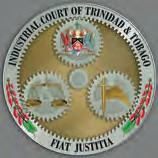
It is my honour to present to you the Annual Report of the Industrial Court of Trinidad and Tobago for the period September 22, 2014 to September 14, 2015.
This Report is submitted pursuant to Section 83 of the Industrial Relations Act Chapter 88:01.
Yours Respectfully,
Deborah Thomas-Felix PRESIDENT

3 / ANNUAL REPORT 2014-2015
Functions oF the court
The Industrial Court of Trinidad and Tobago was established on March 20th, 1965 by section 5(1) of the Industrial Stabilisation Act. This Act was repealed and replaced by the Industrial Relations Act, Chapter 88:01 on July 31st 1972.


The Industrial Court is a superior court of record. As a superior court of record it has a status that is equivalent to that of the High Court of Justice. It is a specialised court with its own peculiar jurisdiction; it is responsible for dispensing social justice.

In addition to its inherent powers as a superior court of record, the Court has jurisdiction –
• To hear and determine trade disputes;
• To register collective agreements and to hear and determine matters relating to the registration of such agreements;
• To enjoin a trade union or other organisation or workers or other persons or an employer from taking or continuing industrial action;
• To hear and determine proceedings for industrial relations offences under the Act; and
• To hear and determine any other matter brought before it, pursuant to the provisions of the Act
The principal role of the Court is to settle unresolved disputes and other matters which arise between employers and trade unions representing the workers employed by the employers under the Industrial Relations Act, Chapter 88:01 (I.R.A.), the Retrenchment and Severance Benefits Act, No. 32 of 1985, the Maternity Protection Act, No. 4 of 1998 and the Minimum Wages (Amendment) Act, No. 11 of 2000, and the Occupational Safety and Health Act (1 of 2004) as amended.

The Court sits in two Divisions:
a) The General Services Division which exercises the jurisdiction of the Court as set out in section 7 of the Industrial Relations Act, Chapter 88:01 with respect to services other than essential services ; and
b) The Essential Services Division which exercises the jurisdiction of the Court as set out in section 7 of the Industrial Relations Act, Chapter 88:01 with respect of essential services.
The Special Tribunal established by the Civil Service Act, Chapter 23:01 hears and determines disputes in the Civil Service, the Police Service, the Fire Service, the Prison Service, the Teaching Service, the Supplemental Police and the Central Bank.
4 / INDUSTRIAL COURT OF TRINIDAD AND TOBAGO

5 / ANNUAL REPORT 2014-2015 O rganisati O nal C hart
President’s Message
Her Honour Mrs. Deborah Thomas-Felix, President
We live in very difficult and uncertain times. This is an era where we witnessed the brutal slaughter and massacre of humankind and we recoil in horror at the savage and pernicious nature of attacks by entities and individuals such as ISIS, Boko Haram, and the Boston Bombers. On these shores, many of us have been deeply affected by the level of crime and violence perpetuated on this nation.

On the economic front, the effect of the 2008 financial crisis, which almost brought down the world’s financial systems, is still being felt, with its repercussions gaining the most attention in what were hitherto “rich countries”. The fallout has strongly impacted on Europe culminating in the Eurozone debt crisis that started in earnest in late 2009 and has evolved into a multi-year debt crisis.
In Trinidad and Tobago, the country’s economic performance and outlook have been adversely affected by a sequence of negative developments including the 2008 financial crisis, falling oil and gas prices and the recent downgrade in the country’s investment credit rating. Trinidad and Tobago has joined the rest of the world and has begun regulatory reforms on banks and financial houses in an effort to stem the tide of the financial crisis. Recent estimates provided by the Central Bank of Trinidad and Tobago suggest that real Gross Domestic Product (GDP) contracted by “0.5 percent in the first quarter of 2015, the first such decline since the second quarter of 2012 when real GDP fell by a deeper 2.5 percent.”

Growth in the region continues to stagnate as countries grapple with the fallout from the economic crisis, exacerbating high and rising debt to GDP ratios which have threatened to erode and destabilise their economies. The economies of Barbados, Jamaica and Guyana are experiencing various economic challenges, while the smaller economies of the English-speaking Caribbean are faced with high and increasing unemployment rates.
The statistics are most alarming with respect to the youth in the region. In some cases - as in St. Lucia - youth unemployment represents an excess of 27% according to the World Bank. At the broader national level overall unemployment in St. Lucia is projected at 24.9% for 2015. Globally, estimates of joblessness among young persons aged 15-24 years rose by 15% between 2008 and 2014. The number of unemployed people worldwide rose from 170 million before the onset of the world financial crisis in 2008 to an estimated 206 million in 2014 and is projected to rise to 215 million by 2016.
On the environmental front, environmental degradation and resource depletion have become ever more visible as we experience natural disasters such as floods, hurricanes and earthquakes. The most recent experience of Dominica following Tropical Storm Erika underscores the inherent vulnerability of Small Island Developing States (SIDS) where years of development gains and economic progress can be wiped away in less than a day, with often tragic consequences.
The world is also facing pressing challenges as large numbers of people cross borders seeking refuge from difficult political, social and economic developments. We only have to look at Europe to fully appreciate the depth, breadth and gravity of the refugee crisis with its obvious economic, social and legal implications.
At the same time global demand for minerals and resources has increased, pushing against the limits of what the planet can sustainably provide.
6 / INDUSTRIAL COURT OF TRINIDAD AND TOBAGO
The greatest environmental challenge however, and one which I dare say will inevitably engage the attention of every country in the world, is climate change, which threatens to undermine the very basis of human civilisation. This climate crisis is inextricably linked to other environmental concerns such as water availability, waste disposal and the depletion of biodiversity.
chaos, has effectively quelled the flames of discord and economic instability in this country and has created order and structure in the practice of industrial relations.
I concur with Dr. Leighton Jackson when he opined at the Court’s Symposium this year that: “The establishment of the Industrial Court of Trinidad and Tobago must, therefore, be considered the most important institutional construct in modern democratic governance in the Commonwealth Caribbean from the point of view of the history of these states”…. and that “the signal function of the Industrial Court is one of reconstituting relationships in a society where radical changes were necessary for the transformation of the society into one in which everyone finds an equal place.” 2
It is in this global and regional context that the Industrial Court of Trinidad and Tobago celebrates fifty (50) years as a key contributor to social justice delivery in this country. When the Industrial Stabilisation Act1 (ISA) became law in March 1965, a new regulatory framework was introduced to the practice of labour relations in this country. The legislative arm of the State at the time acknowledged that economic stability is a key factor to the development of a new nation. As a result, there was a critical need for employers, workers and trade unions to peacefully resolve disputes. One of the main purposes of the Act as stated in its preamble was to provide for:

“the establishment of an expeditious system for the settlement of trade disputes.”
The “expeditious system” for the settlement of Trade Disputes was then and remains today the Industrial Court of Trinidad and Tobago.
Theorists of Organisational Behaviour argue that out of chaos some of the most resilient and important systems are conceived. The Industrial Court was created from an environment of chaos, turbulence and discord and was appointed as the vehicle to quell the flames of mistrust and economic instability in society. This vehicle, created from
A wealth of jurisprudence has emanated from the Industrial Court in these past fifty (50) years which provides guidelines on the rights, duties and obligations of employers and employees in the workplace and represents the hallmarks of the principles and practices of good industrial relations in this country.

7 / ANNUAL REPORT 2014-2015
A wealth of jurisprudence has emanated from the Industrial Court in these past fifty (50) years which provides guidelines on the rights, duties and obligations of employers and employees in the workplace
1 Industrial Stabilisation Act 8 of 1965
2 “The Jurisprudence of the Industrial Court of Trinidad and Tobago – 50 Years of Delivering Social Justice” address delivered by Dr. Leighton Jackson, Deputy Dean, Faculty of Law, University of the West Indies, Mona, at the Meet with the Court Symposium 3 on May 16th 2015 at Hyatt Regency, Trinidad
President’s Message
Labour relations and the practice of employment law in Trinidad and Tobago have also evolved over the past decades from an antagonistic, unstable and uncertain environment to a well-structured system of compulsory arbitration which has been very effective despite some bumps in the road and the requisite growing pains.
This year as we celebrate fifty (50) years as an institution, I crave your kind indulgence, as I chronicle the key legislative changes which were made from 1965 to 2015, to provide some context about the role and jurisdiction of the Court.
The ISA was passed in Parliament on 19th March, 1965 and was assented to by the Governor General the next day, 20th March, 1965. At its inception in 1965, the complement of Judges was five (5). In 1967, the ISA was amended to allow for the increase in the membership of Judges of the Court from five to seven and the amendment also enabled the Court to sit in more than one Division as long as the President or Vice President presided as the Chairman.3
However, in the matter of Trinidad Bakeries Ltd & National Union Foods, Hotels, Beverages and Allied Workers & The Attorney General on behalf of the People of Trinidad and Tobago,4 the Court of Appeal ruled that the “Industrial Court has no jurisdiction to make a non-consensual order or award for the reinstatement of dismissed workers and that, accordingly, it acted ultra vires in making such an order”. In short, the Industrial Court had no power to reinstate workers. As a result, there was a second amendment to the ISA on June 14th 1967,5 which conferred powers to the Industrial Court to reinstate workers. This Amendment also made the Industrial Court a Superior Court of Record with all the powers inherent in such a court.
The constitutionality of the ISA was challenged in the famous case of Collymore v. Attorney-General, 1967, 6 and as a consequence of that challenge the Act was repealed and replaced by the Industrial Relations Act 23 of 1972.7
The new IRA facilitated the creation of the Office of Economic and Industrial Research whose main purpose is to provide research to support the Industrial Court and the social partners of the industry. The Registration, Recognition and Certification Board is also a creation of the IRA. Its main function is to peruse applications which are made by trade unions for bargaining status and to issue Certificates of Recognition where necessary.
The first amendment of the IRA was in 1978,8 this amendment provided for two (2) Divisions of the Court, namely, the General Services Division and the Essential Services Division.
In 1979, the IRA was further amended to provide for the President of the Republic to indicate to which Division of the Court Judges were appointed.9 The last amendment of the IRA was in 1987, this amendment enabled the Minister of Labour to refer an unresolved dispute to the Industrial Court after a period of three months (3) or more of continuing industrial action.10
These changes have shaped the Industrial Court into the type of Court we have today; a Court for which the practice of good industrial relations, fairness, equity and good conscience are the cornerstones and the bedrock upon which its superstructure is sustained. The Industrial Court is the avant garde which continues to pre-empt socio-economic crisis in Trinidad and Tobago and across the globe. Not only has the Court been purpose built for problem solving, it is well built to handle the myriad problems of a modern democratic society. 3 Act 6 of 1967

5 Act 11 of 1967
6 Collymore v. Attorney General (1967) 12 WIR 5: (1969) 2 ALL ER 1207
7 Industrial Relations Act 23 of 1972, Chapter 88:01 of the Laws of Trinidad and Tobago
8 Act 44 of 1978
9 Act 2 of 1979
10 Act 3 of 1987
8 / INDUSTRIAL COURT OF TRINIDAD AND TOBAGO
4 Trinidad Bakeries Ltd & National Union Foods, Hotels, Beverages and Allied Workers & The Attorney General on behalf of the People of Trinidad and Tobago Civil Appeal 53/1966, TD 2/1966
Labour relations and the practice of employment law in Trinidad and Tobago have also evolved over the past decades from an antagonistic, unstable and uncertain environment to a well-structured system of compulsory arbitration
Over the past fifty (50) years, the Court has expanded its operations significantly. On April 29, 1965, the new Industrial Court held its first sitting at the Sixth Supreme Court, situated at the Red House, Port of Spain. In October, 1965 the Chronicle Building on St Vincent Street, Port of Spain was renovated to house the Court. Thirty-two (32) years after on May 27th 1997, the Prime Minister of the day Basdeo Panday, handed over the building where we are currently located to the then President of the Industrial Court, Mr. Leo P. E. Ramchand.
The Court expanded its operations to southern Trinidad when on February 15th, 2005 under the leadership of the then President Addison M. Khan; it opened a Branch in San Fernando. In 2015, the Industrial Court acquired a building in Tobago for its use which we hope will be fully operational in 2016.
In Trinidad and Tobago, the practice of industrial relations remains very dynamic as the employment contract continues to evolve and to adjust to a highly technological and globalised workplace. Meaningful employment and opportunities to work are central to citizens’ well-being and are important to a country’s social and economic advancement.
It is through the financial reward which is received from work that families, communities and countries are strengthened and empowered. Moreover, economic growth is inextricably linked to the earning capacity of households. Consequently, a decrease in disposable household income without doubt will negatively impact a country’s economy.
The time has come therefore for employers, Trade Unions, workers, and practitioners of industrial relations to lend support and encourage each other to work symbiotically to develop innovative and creative business techniques and policies at the workplace in this time of economic challenge.
This is the time for us to pool our collective human, economic and technical resources and to marshal all our formidable talents in service to our people. Our nation’s patrimony and our children’s future are at stake and more importantly, they are in our hands.
As a people and as citizens of this country and the world, we need to work collectively towards making those difficult decisions which will positively impact the growth, development and security of our nation. This is imperative, particularly at a time when there are myriad socio-economic challenges facing employers and workers daily worldwide.

In this context, there exists a need for us to examine the informal economy in Trinidad and Tobago. This includes persons who hold multiple jobs in various fields to maintain their families. They may sometimes hustle on the beaches and in the streets; in parks and in neighbourhoods; people making craft, fisher folk - if there is still fish - persons working as babysitters or cleaners in homes. Some are engaged in giving aid to the aged in our communities and others provide ad hoc and unstructured security at dwelling houses.
A closer examination into these “odd” jobs will allow us to determine whether the conditions of work are safe, whether persons face discrimination of any kind and whether they are adequately compensated for the work they do.
Should these people be categorised as workers in the Industrial Relations sense? What is the impact of their contribution on the national economy?
These questions are important for us in Trinidad and Tobago. We tend to pay lip service to the informal economy, it is like the ghost lurking around that nobody acknowledges or seldom sees.
The time has come for us to develop more coherent strategies for the informal economy to assist in measuring the contribution of those engaged in this sector to the nation’s GDP. We should examine how this informal economy impacts the socio-economic development and how we can assist in defending the dignity of those who are so employed.
DECENT WORK
I guess you will be thinking by now about Decent Work and how it affects the informal economy. Let me indicate that Decent Work is a globally accepted goal and instrument for improving the lives of people. The term was endorsed by the tripartite constituents of the International Labour Organisation (ILO) member states at its 87th Conference in 1999.
Decent Work is defined as: “productive work in which rights are protected, which generates an adequate income with adequate social protection. It also means sufficient work in the sense that all should have access to income earning opportunities. It marks the high road to economic and social development, a road in which employment, income and social protection can be achieved without compromising workers’ rights and sound standards.”
9 / ANNUAL REPORT 2014-2015
President’s Message
What, therefore, is Decent Work? It is the understanding that work is a source of personal dignity and stability in family units, that it brings about peace in communities and it is an important tool for economic growth, innovation and expansion of opportunities for productive jobs and enterprise development in this country.

The Court therefore has a vested interest in promoting and operationalising the concept of Decent Work and in ensuring that respect for labour standards and fundamental principles and rights at work, social protection and the practice of good industrial relations, is paramount.
A REVIEW OF THE WORK OF THE COURT
The Court continues to encourage parties to adopt a conciliatory approach to solving disputes and, despite challenges, we continue to deliver judgments in a timely manner.
The statistics show that during the period 2010 to 2012, the number of disputes filed was 2,594, while the number of disputes disposed was 1,443. During the period 2013 to 2015, the total number of disputes filed was 2,384 and the total number of disputes disposed was 2,089. These figures show an 8% decrease of disputes filed at the Industrial Court and a 45% increase of disputes disposed. This increase is mainly due to the conciliatory approach and the effective conciliatory services which are provided by the Court.
ACCESS TO JUSTICE IN TOBAGO
The Industrial Court continued its access to justice initiative in Tobago. This year, the Court convened its sitting in Tobago from 17th – 25th August, 2015. I was joined by Their Honours Mr. Lawrence Achong, Chairman, Essential Services Division, Mr. Albert Aberdeen, Mr. Melvin Daniel and Mr. Roger Jugmohan. We presided over thirty-two (32) disputes. Eleven (11) judgments were delivered and five (5) disputes were resolved and consent orders were entered. One (1) dispute was settled at conciliation and eleven (11) matters heard at Case Management.
The Judges must be commended for their dedication and for foregoing their vacation leave to resolve these disputes in
Tobago. Many thanks to the staff for their hard work and continued support.
My heartfelt gratitude to the Learned Chief Justice of Trinidad and Tobago, Mr. Justice Ivor Archie, for his continued support and for allowing us the use of the facilities at the Supreme Court in Tobago.
Special thanks to Mr. Derek Ali, Attorney at Law, Mr. Mario Als, Mr. Kimba Anderson, Mr. Gareth Caesar, Mr. Clyde Elder, Mrs. Marcelline Lewis-Wilkinson, Mr. Courtney Mc Nish, Mr. Gary Andrews, Mr. Lyndon Cowan, Ms. Valerie Philip-Paul, Mrs. Vanessa Murray-Chapman, Mr. Brian Murphy, Mr. Codrington Winchester, Mr. Ken Davis, and Mr. Robert Giuseppi for their participation at these hearings.
When I became President of the Court, I expressed the desire to improve access to the Industrial Court for all citizens of Trinidad and Tobago. I am proud to announce that the Industrial Court has acquired a 199 year lease for the premises which is known as Sandy Hall in Scarborough, Tobago.
I am very thankful that the Chief Secretary, Mr. Orville London, understood and accepted my vision and has graciously provided the building in Tobago for the Court’s use. We are currently in the process of remodeling and redesigning the interior of the building and hopefully by next year, 2016, we will have a permanent Industrial Court in Tobago.
Thanks again to the Chief Secretary, Mr. Orville London.
MEET WITH THE COURT SYMPOSIUM
The Meet with the Court Symposium continues to be a big ticket item on the Court’s annual calendar.
The Symposium was held at the Hyatt Regency on 16th May, 2015. The theme this year was “The Road to Social Justice”. The request for invitations to the event was overwhelming and we apologise to those to whom we were not able to extend an invitation. This difficult decision was only due to budgetary constraints. As in the past years this symposium was a resounding success. Let me therefore extend our sincere thanks to Dr. Ralph Henry, Dr. Leighton M. Jackson, Mr. Jefferson Cumberbatch, Mr. Gaekwad Ramoutar, Mr. Rainer Pritzer and to you, the stakeholders for your participation and support for the event.
10 / INDUSTRIAL COURT OF TRINIDAD AND TOBAGO
INTERFAITH SERVICE
The Court held an Interfaith Service at the Cathedral Church of the Most Holy Trinity, Port of Spain on 24th March, 2015 to celebrate its golden anniversary and to give thanks for its accomplishment in social service delivery over the years.
Many thanks to The Right Reverend Claude Berkley, Reverend Dr. Knolly Clarke, Dean Emeritus, Reverend Father Carl Williams, the performers, stakeholders, the Members and staff of the Industrial Court, former and current, for their attendance and support of this event.
TRAINING
Their Honours, Mrs. Judy Rajkumar-Gualbance and Mrs. Heather Seale attended a course in Judicial Writing at the National Judicial College in Reno, Nevada, USA in April, 2015.
In July this year, two Court Reporters, Ms. Beulah Dalrymple and Ms. Portia Craigwell, attended the National Court Reporters’ Association Annual Convention in New York. The hope is that these two (2) members of staff can provide in house training as we continue to build the Court Reporting service at the Industrial Court.
The Court held a retreat for the staff at the Radisson Hotel on 2nd August, 2015. This retreat was very important in advancing the Court’s development and the report and concerns which emerged from this experience put us in a much better place to facilitate team building and institutional strengthening going forward. Training in the area of Conciliation for all judges at the Court was provided from the 9th to the 11th September, 2015 as we continue to build the capacity of Judges in various subject areas.
CHALLENGES
Court Reporting
Currently there is a chronic shortage of Court Reporters. I am sure many of our stakeholders have been experiencing some delay in receiving Notes of Evidence in their matters. Of the twenty-two (22) positions of Verbatim Reporter 1, fifteen (15) are vacant. During the last year one (1) Verbatim Reporter retired and another is due to retire next year so there are currently seven (7) Verbatim Reporter 1 employed at the Court.
There are also three (3) positions of Verbatim Reporter II comprising of two (2) office holders and one (1) acting incumbent.
It is extremely difficult for the Court to properly function with ten (10) out of twenty-five (25) reporters. This shortage has directly affected the operations of the Court and has resulted in delays in preparation of notes which are needed by Judges to prepare and write their judgments. Also, the Court cannot in many cases furnish parties with notes of evidence when they are requested.
I have held several meetings with the Chairman of the Public Service Commission who is deeply concerned and has been very supportive in trying to find a solution to this grave problem. One can appreciate that the skill of a Court Reporter is very unique and difficult to obtain. Therefore, despite advertising, we have not been able to find persons with this skill set. We are actively seeking solutions for this problem and ask for the patience and understanding of stakeholders while we resolve this problem.

Inadequate space
In 2012, I addressed you, the social partners, on the chronic problem of space at the Court. On that occasion I said “Space at the Court’s Port of Spain building is a perennial problem. Judges and staff occupy spaces in this building which are less than ideal and which are certainly not adequate. This lack of space has stymied the operations of the Court and has prevented the Registry, the Library, the Accounts Department, the Verbatim Note Taking Section, the IT Unit, the Secretariat, the Research Unit and the Security Unit from properly functioning. In fact, due to the lack of space, the staff of the Library has been removing older books from the shelves and storing these books at an external warehouse in an effort to find space for new volumes which have been purchased. This greatly affects the quality of service which the Library can provide. The Staff of the Registry currently make use of one of the Witness Rooms to perform duties daily due to the cramped conditions at the Registry. Each department can share reports of some of the ways in which they have attempted to deal with the cramped space in their department. While I do not in any way want to be an ungracious and rude neighbour there is need for the Industrial Court to take control of and occupy all floors of the Port of Spain building, a building for which we provide funds for all of the operations.” 11
The problem is more chronic now in 2015. There has been an increase in staff and Judges at the Court and we anticipate
11 / ANNUAL REPORT 2014-2015
President’s Message
that there will be a greater reliance on the Court services as the economy continues to contract. It is very important that the physical facility at the Court is comfortable for staff and users and I look forward to a speedy resolution of this problem by the relevant authorities.
NEW MEMBER OF THE INDUSTRIAL COURT
In October, 2014, His Honour Mr. Morton Mitchell was appointed a Member in the General Services Division. Industrial Court welcomes His Honour Mr. Mitchell and wishes him great success in his career at the Court.
TRIBUTE TO HIS HONOUR MR. ADDISON MASEFIELD KHAN
Former President Of The Industrial Court
It is with deep sadness that we mourn the passing of His Honour Mr. Addison Masefield Khan, former President of the Industrial Court. Mr. Khan died peacefully on 9th September, 2015.
Mr. Khan served as a Member of the Industrial Court of Trinidad and Tobago from 1st November, 1986 to 20th March 1993. He was elevated to the position of Vice President on 21st March 1993 and he served in that position until 12th December 1999, when he had the distinction of serving as the fourth President of the Industrial Court from 13th December 1999 to 12th December 2005.
Mr. Khan made a tremendous contribution to the development of the Industrial Court and to the development of industrial relations jurisprudence in this country. Many of his judgments are regarded as authorities on various issues in industrial relations. Kindly permit me to extend to the family of the late President, the deepest condolences from all Members and staff of the Court.

CONCLUSION
Fifty (50) years is a milestone in the life of any institution. As we move towards seventy-five (75) years, the Industrial
September 2012
Court remains committed to the promotion of good labour relations standards and the protection of the fundamental principles and rights at work.
The Industrial Court, a pillar of social justice delivery, continues to promote and encourage a stable industrial relations environment in Trinidad and Tobago which is critical to our nation’s development. A stable industrial relations climate is a very strong link in the chain of economic growth which can serve as the foundation for improving social justice delivery and the quality of life in this country.
Over the next few years we will be steadfast in our duty to ensure that there is social justice delivery as we continue to increase the competency of staff and Judges and strengthen the internal structure of the Court. We remain committed through our judgment to the ideals of inclusiveness, equity and fairness for all citizens of Trinidad and Tobago.
Many thanks to the members of staff, past and present, for their tireless work and commitment to duty. The staff has contributed to a large measure, over the past fifty (50) years, to the efficiency in the operations of the Court and has been the engine room of the Court.
To the former and sitting Judges for their dedication and their unstinting support to the Court for the past five (5) decades, I thank you.
Thanks to the social partners and the public in general for embracing the ideals of the Industrial Court which are founded on the principles of inclusiveness, social peace and social justice. These ideals have made the Court the unique institution which it is today.
Thank you for listening. May God bless you all.
Deborah Thomas-Felix PRESIDENT
12 / INDUSTRIAL COURT OF TRINIDAD AND TOBAGO
11 Annual Report for
– September 2013. Address by Her Honour Mrs. Deborah Thomas-Felix, President of the Industrial Court of Trinidad and Tobago
TribuTe

The Industrial Court mourns the passing of His Honour Mr. Addision M. Khan who died peacefully in his sleep on Wednesday 9th September, 2015. He was 79 years old.
His Honour Mr. Addison Masefield Khan was President of the Industrial Court from December 1999 to December 2005. Prior to his appointment as President, after serving as a Member of the Court for six (6) years, he attained the position of Vice-President: an appointment he received in March 1993.
His Honour Mr. Khan’s professional life began, not as a lawyer, but as a teacher in the Ministry of Education and Culture in 1954. In 1961, he was called to the bar in England and admitted to practice as a Barrister-at-Law in Trinidad and Tobago. In 1962 he became the Assistant Legal Adviser of Texaco Trinidad Inc. He entered into private practice in 1963 where he remained until his appointment as a Member of the Industrial Court in 1986.
Mr. Addison Khan delivered several landmark Judgments on industrial relations during his tenure at the Industrial Court. Among them are Association of Technical, Administrative
and Supervisory Staff and Caroni (1975) Limited – Trade Dispute TD 130/94, Transport and Industrial Workers’ Union and Neal and Massy Industries Limited – Trade Dispute IRO 10-13 et al/89, Oilfield Workers’ Trade Union and Trinmar Limited – Trade Dispute TD 12/94 and Banking and General Workers’ Union and Home Mortgage Bank – Trade Dispute TD 140/97.

After his retirement in 2005, he returned to private practice and continued to specialise in the area of industrial relations and employment law. Mr. Khan is the author of “The Law of Labour and Industrial Disputes in Trinidad and Tobago (2006)” and “A guide to occupational safety and health acts 2004-2006 of Trinidad and Tobago”.
He will be fondly remembered by the Members and staff of the Court. His serene death was befitting of the character of the man he was. May he rest in peace.
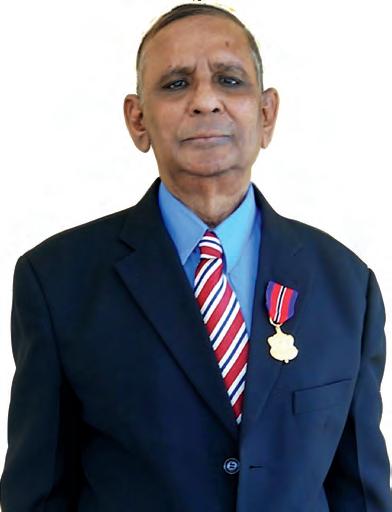
13 / ANNUAL REPORT 2014-2015
His Honour Mr. Addison M. Khan, M.A, LL.M
to Her Honour Mrs. Deborah Thomas-Felix
We are proud to announce that on December 2014, the President of the Industrial Court, Her Honour Mrs. Deborah Thomas-Felix was appointed a Judge of the United Nations Appeals Tribunal (UNAT). The United Nations Appeals Tribunal (UNAT) is an appellate court established by the General Assembly to review appeals against judgments rendered by the United Nations Dispute Tribunal (UNDT). It also hears and passes judgment on appeals from decisions taken by the Standing Committee acting on behalf of the United Nations Joint Staff Pension Board (UNJSPB) and by those agencies and entities that have accepted jurisdiction of the UNAT. She was sworn in on 17th February, 2015 by the Secretary-General of the United Nations, His Excellency Ban Ki-moon. In July 2015, she was elected Second-Vice President of UNAT.



Her Honour Mrs. Thomas-Felix is the first Caribbean national to serve on the UN Appeals Tribunal. She joins six (6) other distinguished Judges of UNAT and they are:
• Justice Rosalyn M. Chapman from the United States of America is the current and seventh President of the Tribunal.
• Justice Sophia Adinyira is from Ghana. Justice Adinyira is the First Vice-President of the Tribunal and was the Third President of UNAT.
• Justice Richard Lussick from Samoa is the immediate past President of the UN Appeals Tribunal.
• Justice Inés Weinberg de Roca from Argentina was the First President of the United Nations Appeals Tribunal.
• Justice Luis María Simón is from Uruguay, and
• Justice Mary Faherty is from Ireland.
Secretary-General Ban Ki-moon congratulated Her Honour Mrs. Thomas-Felix on her appointment and stated “we are grateful for your acceptance of this appointment and for taking on the challenges of this very important function within the internal justice system at the United Nations”. Her Honour Mrs. Thomas-Felix service as a Judge of UNAT requires that she adjudicates on appeals at the Tribunal in Geneva and New York approximately three times a year.
The Members, management and staff of the Industrial Court congratulate Her Honour Mrs. Deborah ThomasFelix on this prestigious appointment.
14 / INDUSTRIAL COURT OF TRINIDAD AND TOBAGO
Congratulations
(From left to right) His Excellency Mr. Eden Charles, Ambassador of the Permanent Mission of the Republic of Trinidad and Tobago to the United Nations, Her Honour Mrs. Deborah Thomas-Felix, President of the Industrial Court and His Excellency Ban Ki-moon, Secretary-General of the United Nations.
50 years at a Glance: Key Milestones


March 1965 – March 2015
1965

First Judges of the Court
The inaugural bench of the Industrial Court of Trinidad and Tobago featured in the Mirror newspaper in March 1965
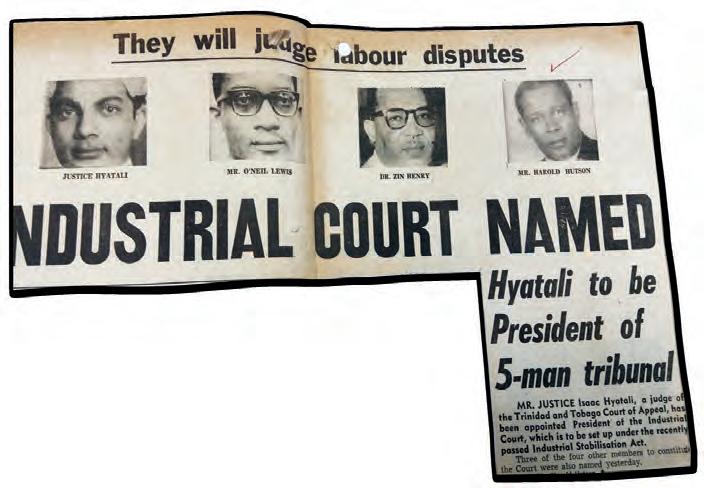
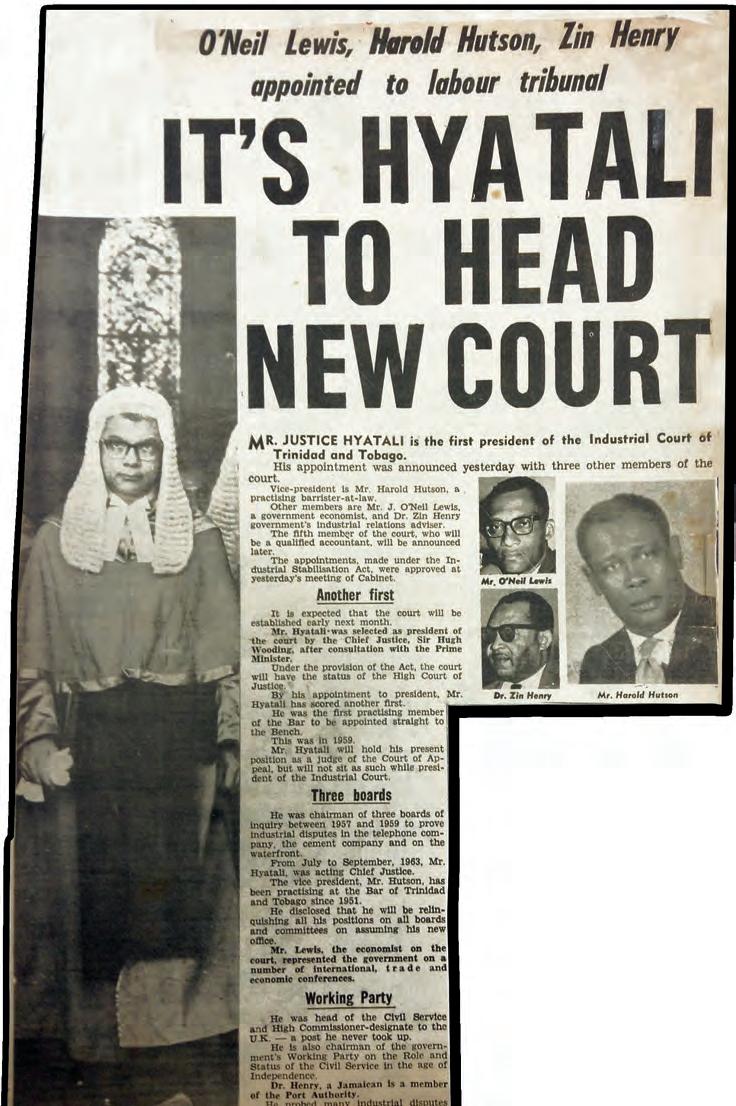

(courtesy National Heritage Library)

16 / INDUSTRIAL COURT OF TRINIDAD AND TOBAGO
First Building

The Industrial Court moves into its new home which was formerly the Chronicle Building on lower St. Vincent Street in Port of Spain in October 1965

(courtesy National Heritage Library)
First Case
(courtesy National Heritage Library)

The first case between the Federated Workers Trade Union and the University of the West Indies, St. Augustine was heard before President, Mr. Justice Hyatali, Mr. Harold Hutson and Mr. J. O’Neil Lewis at the Red House on April 29th 1965

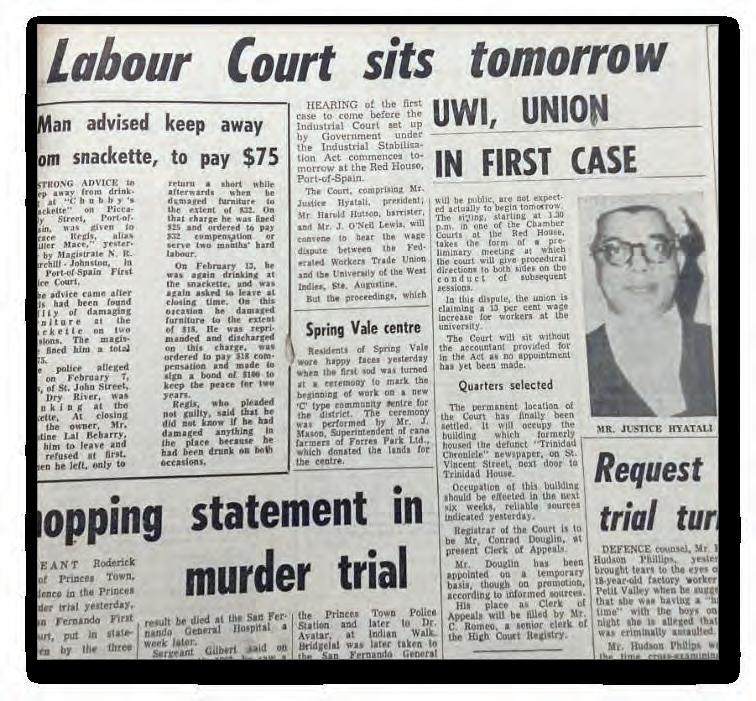
17 / ANNUAL REPORT
2014-2015
1995


Sod turning ceremony for Industrial Court building in Port of Spain
In June 1995, then Prime Minister Patrick Manning turned the sod at the site where the Industrial Court would stand – adjacent the Chronicle Building. Later on the 27th May 1997, then Prime Minister Basdeo Panday officially handed over the Industrial Court Building in Port of Spain to President Leo P.E. Ramchand.

(courtesy Trinidad Express Newspaper)

18 / INDUSTRIAL COURT OF TRINIDAD AND TOBAGO
The Opening of the San Fernando Branch of the Court

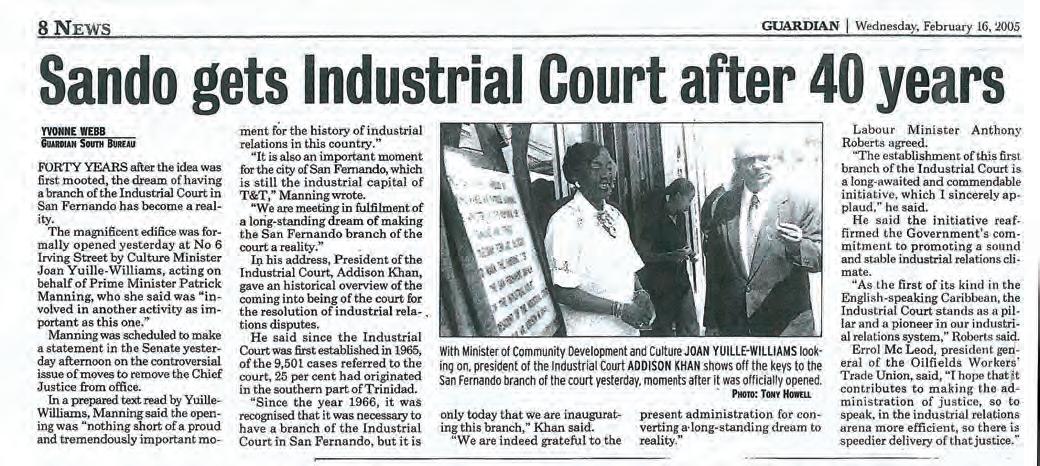



2005
19 / ANNUAL REPORT 2014-2015
The unveiling of the southern branch of the Court on the 15th February, 2005.
2015


Signing Ceremony for the Tobago Branch of the Court
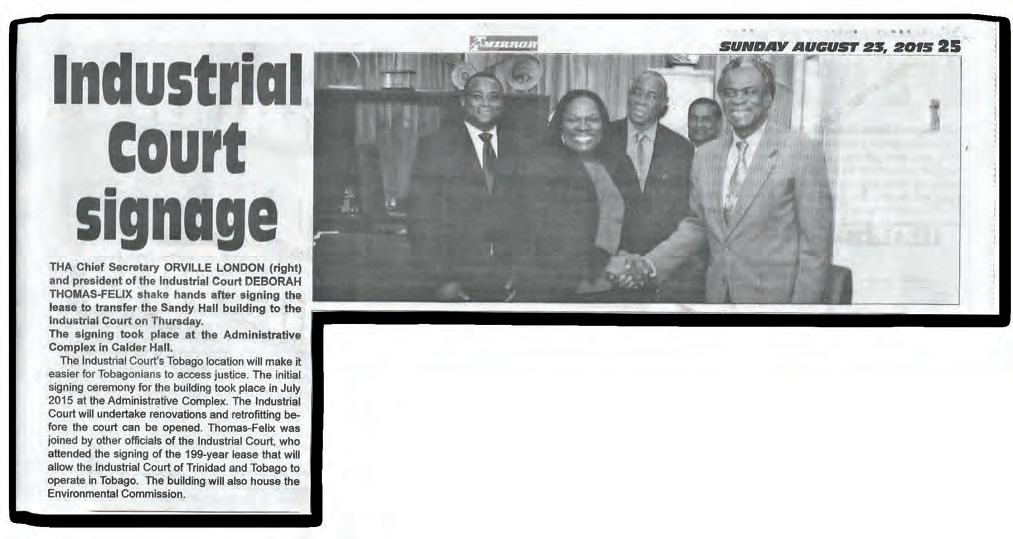
50 years later, the Industrial Court acquires a building in the sister isle of Tobago.
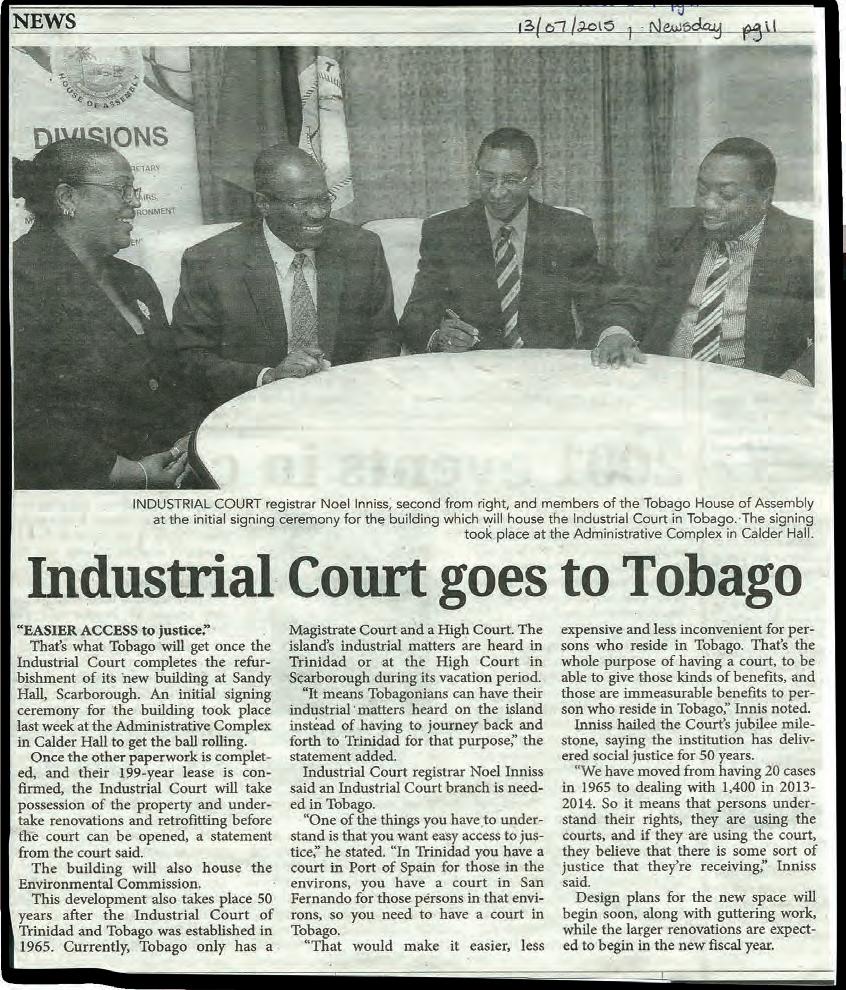

20 / INDUSTRIAL COURT OF TRINIDAD AND TOBAGO
(courtesy TnT Mirror)
(courtesy Newsday)
The Industrial Court Today

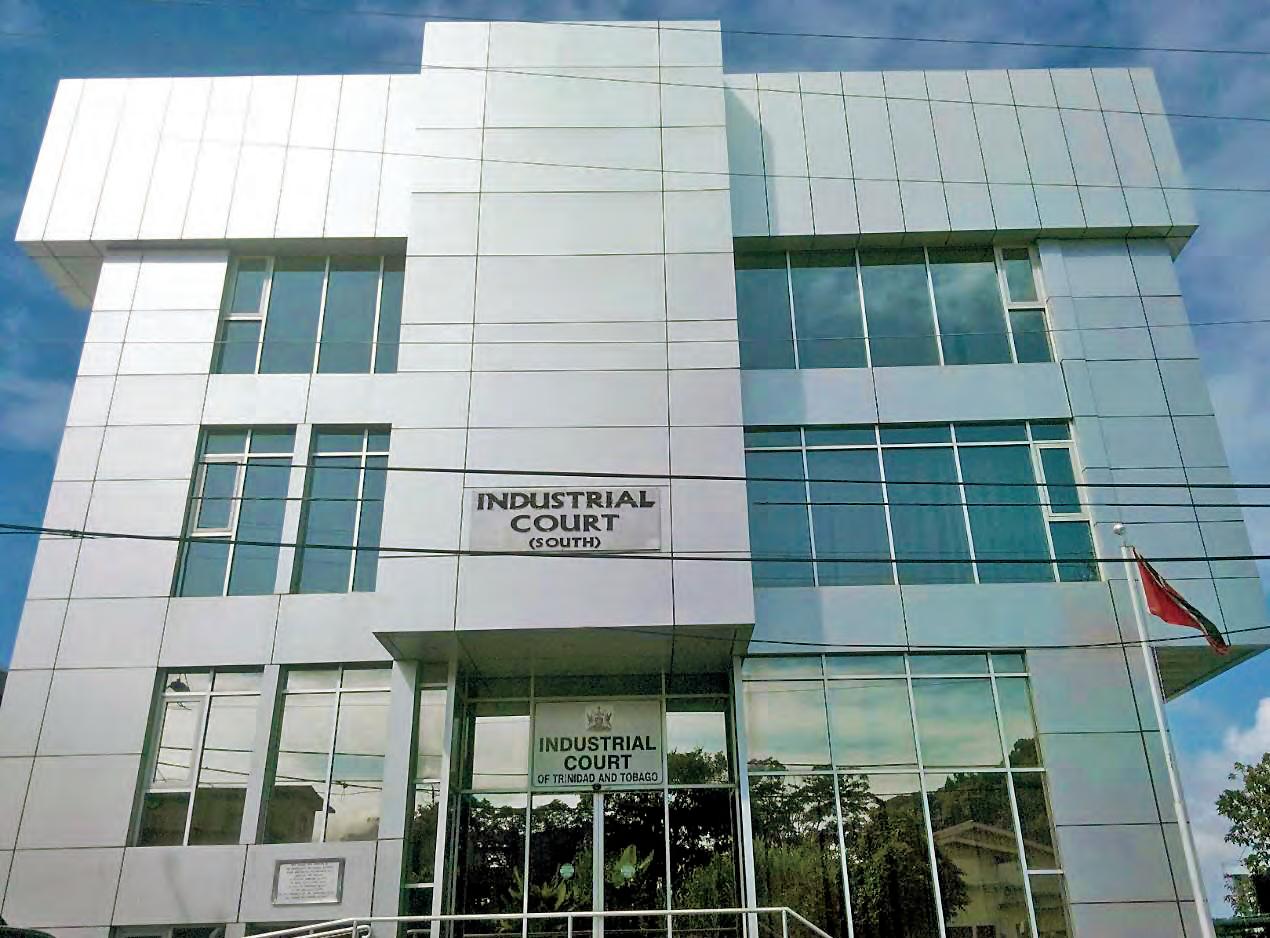


Judges of the Court
1. His Honour Mr. Patrick Rabathaly
2. His Honour Mr. Ramchand Lutchmedial, Vice President
3. Her Honour Mrs. Deborah Thomas-Felix, President
4. His Honour Mr. Lawrence Achong, Chairman
5. His Honour Mr. Albert Aberdeen
6. His Honour Mr. Roger Jugmohan

7. His Honour Mr. Herbert Soverall
8. His Honour Dr. Selwyn Samaroo
9. Her Honour Mrs. Kathleen George-Marcelle
10. Her Honour Mrs. Sandra Ramparas
11. Her Honour Mrs. Heather Seale
12. His Honour Mr. Gregory Rousseau

13. Her Honour Mrs. Janice Christopher-Nicholls
14. Her Honour Ms. Bindimattie Mahabir
1 2 3 6 7 8 9 10 16 17 18 19 20
22 / INDUSTRIAL COURT OF TRINIDAD AND TOBAGO
15. Her Honour Mrs. Judy Rajkumar-Gualbance
16. His Honour Mr. Dinesh Rambally
17. His Honour Mr. Robert Linton

18. His Honour Mr. Nizam Khan
19. His Honour Mr. Mahindra Maharaj
20. His Honour Mr. Brian Dabideen
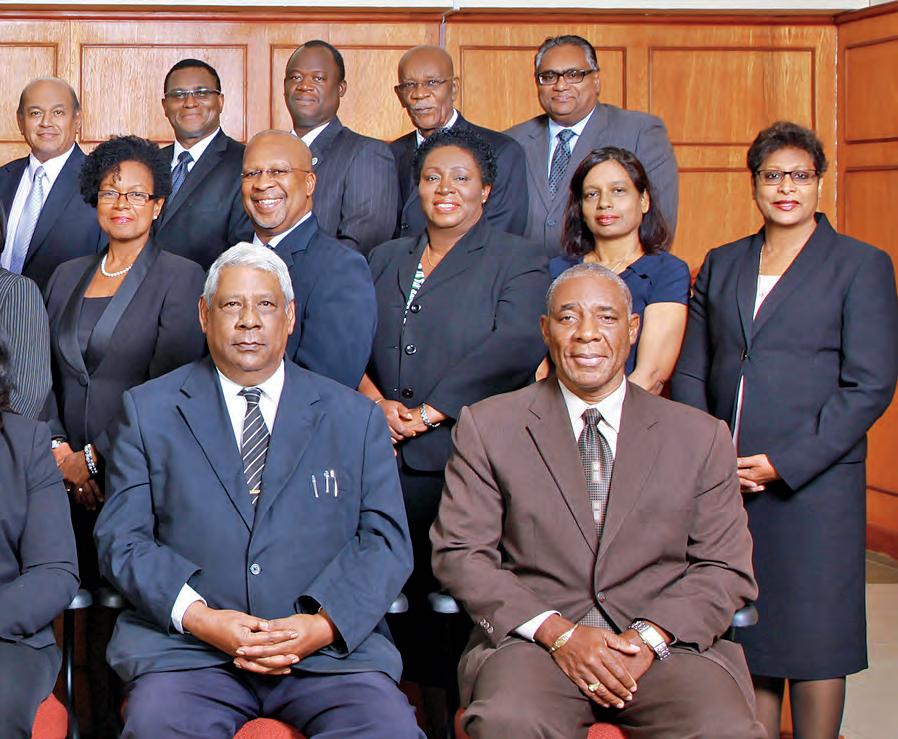
21. His Honour Mr. Khrishendeo Narinesingh
22. His Honour Mr. Melvin Daniel
23. His Honour Mr. Morton Mitchell
24. His Honour Mr. Kyril Jack
25. His Honour Mr. Neil A. Mohammed
4 5 11 12 13 14 15 21 22 23 24 25
23 / ANNUAL REPORT 2014-2015
Registrars and Administrator of the Court



24 / INDUSTRIAL COURT OF TRINIDAD AND TOBAGO
Seated: Mr. Noel Inniss, Registar
Standing from left: Mrs. Youland Robinson, Court Administrator and Mrs. Kathy-Ann Alexander Fraser, Assistant Registrar
Staff of the Court


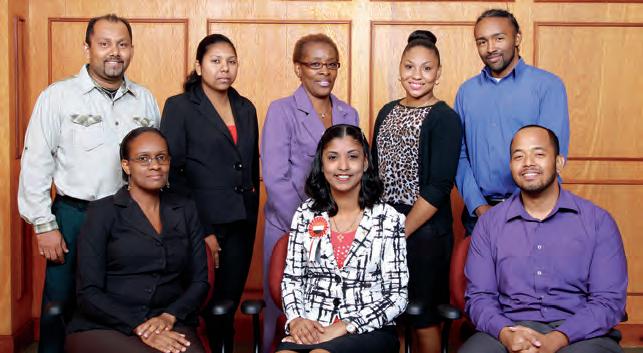
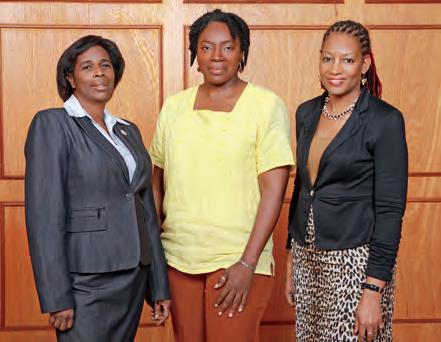


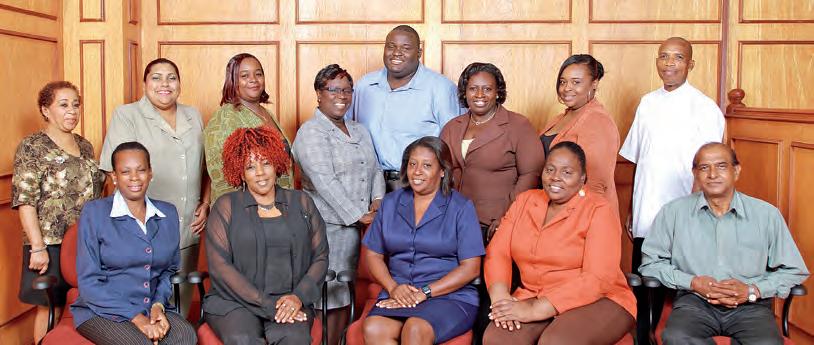


25 / ANNUAL REPORT 2014-2015




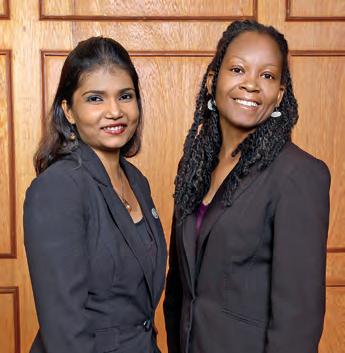


26 / INDUSTRIAL COURT OF TRINIDAD AND TOBAGO
Appointment of His Honour Mr. Morton Mitchell
In October 2014, His Honour Mr. Morton Mitchell was appointed a Member of the Industrial Court of Trinidad and Tobago. He presides as a Judge in the General Services Division of the Court.

His Honour Mr. Morton Mitchell is the holder of a Master of Science degree in Organisation Development and Knowledge Management from the George Mason University School of Public Policy, and a Bachelor of Arts Degree in Labour Studies from the National Labour College in Silver Springs Maryland. He is also a Certified Safety Training Specialist with the National Association of Safety Professionals.

Retirements
Mr. Mitchell brings to the Court over fifteen (15) years of experience in the fields of occupational safety and health and industrial relations. Prior to joining the Industrial Court, he worked at the Ministry of Labour and Small and Micro Enterprise Development where he served as the Chief Labour Inspector Specialist. He is a former Director of the Occupational Safety and Health Authority (OSHA) and a former Director of the Board of CEPEP Company Limited.
During the period 1998 to 2008, the newly appointed Member was actively involved in the labour movement where he served as Treasurer and later, as General Secretary of the Federation of Independent Trade Unions and NGO’s (FITUN). He also served as the General Secretary of the Trinidad and Tobago Fire Service Association (Second Division).
Mrs. Sandra Harr y-Ramdin entered the Public Service as a Temporary Clerk I (Range 14) with effect from 17th November 1976 at the Ministry of Finance, Treasury Division. She was appointed Clerk I (Range 14) on 1st January 1979 and Clerk II (Range 20C) on 25th April 1983.
On 31st December 1991, Sandra was promoted Accounting Assistant (Range 25E) at the Ministry of Finance, Inland Revenue Division, where she acted Accountant I (31C) for six (6) years and later as Accountant II (Range 35G).
On 1st July 2009, Sandra assumed acting as Accountant II (Range 35G) at the Industrial Court. During her tenure at the Court, she was promoted to Accountant I (31C) on 7th May 2010, Accountant II (Range 35G) on 22nd May 2012 and Accounting Executive I (Range 54) with effect from 20th February 2014.
Mrs. Sandra Harry-Ramdin will retire from the Public Service on 17th October 2015.

Mr. Heeralal Ramgoolam entered the Public Service with effect from March 2005 as a Temporary Messenger I (Range 9) at the Ministry of Finance, Inland Revenue Division. He was appointed Messenger I (Range 9) with effect from 1st May 1980. He acted Bailiff I (Range 21) with effect from 5th December 1997.
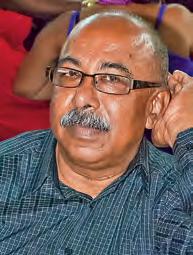
Mr. Ramgoolam was promoted Bailiff I (Range 21) on 11th April 2000 and further advanced to Bailiff I (Range 24C) on 5th December 2002. On 15th February 2005, he was transferred to the Industrial Court, San Fernando.
Mr. Heeralal Ramgoolam retired from the Public Service on 7th December 2014.
27 / ANNUAL REPORT 2014-2015
Reports
ADMINISTRATION
LIBRARY SERVICES
HUMAN RESOURCE MANAGEMENT
ECONOMIC AND INDUSTRIAL RESEARCH
LEGAL SERVICES

FINANCIAL REVIEW
INTERNAL AUDITOR’S REPORT

28 / INDUSTRIAL COURT OF TRINIDAD AND TOBAGO
AdministrAtion
As the Court traverse the turbulent economic period facing our nation, the initiative to strengthen the Court’s offering to its stakeholders and to build the Court’s capacity continues.

A Court Administrator has been recruited who will have oversight over the administrative matters of the Court particularly the Court’s Registry. The Legal Department has been established which will enhance the services offered by the Court and comprises two (2) legal officers. Finally, the Communications Department which was established in 2013 recently increased its complement of staff with the addition of two (2) assistants and continues to play a critical role in the Court’s transformation process.
E-COURT
In making the registry more efficient and effective, the Court has instituted a Radio Frequency Identification (RFID) system for the Registry files. RFID is a wireless system that automatically identifies and tracks files which
have been tagged. This system would allow the Registry staff to locate any file in the shortest possible time (See Diagram A). It is expected that the RFID process will be completed by the end of September, 2015.

The Court in its drive to become an e-Court has begun to scan all documents filed with the Court. These documents can now be seen on the Judicial Enforcement Management System (JEMS) to which the Judges, Registrars and key departments such as Registry, Office of Economic and Industrial Research (OIER) and Library have access. This is another step in the e-Court transformation process. The next step is upgrading the court management software and computer systems after which the Court would be able to provide e-filing services.

29 / ANNUAL REPORT 2014-2015
Diagram A
AdminstrAtion
INFORMATION TECHNOLOGY
Over the years the Court has made great strides in transforming the Court into an e-Court. From 2011 to 2014, some of these initiatives included:
• the introduction of a Kiosk in Port of Spain and San Fernando;
• the use of Digital Signage in both Port of Spain and San Fernando;
• Video Conferencing from the Port of Spain to the San Fernando and outside of Trinidad and Tobago; and
• the investment in more tower servers to manage the data of the Court.
These initiatives enabled faster and more real-time communication of information as well as improved the efficiency of the Court. For the 2014-2015 period, further initiatives were undertaken as a consequence of the continued growth of the Court.
• The implementation of the scanning of all registry documents filed and the increased demand for notes from the Court required an expansion of the Court’s storage capacity. To achieve this, rack servers were introduced to augment the capacity of the existing server towers. Additionally, the Court examined storage devices, namely the Network Attached Storage (NAS) and Storage Area Network (SAN). Both the NAS and the SAN are computer data storage servers; however the NAS was purchased as the preferred storage server for the Court.
• The firewall used by the Court was upgraded with capabilities to control wired and wireless equipment throughout the Court. By the next fiscal year the Court will be implementing a wireless service accessible to all stakeholders coming to the Court. This will allow them to browse the internet and retrieve mail while waiting for hearings or directions at the Court.
• The current website needs to be upgraded. The Court has begun to look at website developers for the redesign of the webpage to incorporate the Tobago branch of the Court.
• The present software Judicial Enforcement Management System (JEMS) while useful, does not offer all the functionalities that are required by the Court. The Court has begun to examine similar court management software systems with a view to changing the old system by the end of the next fiscal year.
REPORTING
The Reporting Department consists of Verbatim Reporters and Computer Aided Transcript (CAT) Reporters.
Verbatim Reporters section comprises three (3) Verbatim Reporters II and twenty-two (22) Verbatim Reporter I. However, only seven (7) of the Verbatim Reporter I position are with incumbents. During the year in review this department received three (3) new Diamante Stenograph Machines to replace the now obsolete machines. Note taking, storage and retrieval of notes are much faster with the new machines. The Verbatim Reporters also received new chairs at their work stations and ergonomic keyboards have been sourced for the Reporters to be used in the Courtrooms.

The Computer Aided Transcript (CAT) section comprises six (6) CAT Reporters and form part of the general Reporting Department. Both the Senior CAT Reporter and the CAT Reporter II provide real-time services to the Judges of the Essential Services Division (ESD) as well as the General Services Division (GSD) of the Court. They also provide copies via email to Judges who, from time to time, request this service. The CAT Reporter I, while not required to provide real-time services to Judges, utilise the real-time system which is designed to improve reporting accuracy and general efficiency which ultimately speeds up the process of transcript delivery to Judges and/or the Court’s stakeholders.
Surface Pro (tablet) Pilot Project
A CAT Reporter II and one of the Judges were issued Surface Pro (Tablets) to be used for the purpose of providing realtime service to the Judge in the Courtroom instead of using the desktop computers. The project was successful and
30 / INDUSTRIAL COURT OF TRINIDAD AND TOBAGO
complete implementation is expected over the upcoming financial year.
The Reporting section of the Court is one of the most important areas in the Court processes as they provide all the notes to Judges and Court litigants. Recently, there has been a backlog of notes because there are not enough reporters available due to retirement and the inability to fill the vacancies. One of the key challenges in filling vacancies is that the skill set is extremely rare in Trinidad and Tobago. The tools of the Reporter have evolved and are now deeply embedded in technology. Nevertheless, the Reporters are committed to professionalism and efficiency and will continue to provide dedicated service to the Court.

PROJECTIONS FOR THE UPCOMING YEAR
The Court in expanding its access to justice intends to implement the following in the upcoming year:
• Creation of the position of Court Managers.
• Continue the restructuring of the Registry Department.
• Improve the existing Court Management System.
• Improve the networking system.
• Complete the Development of the Tobago Office.
• Complete the wireless access to the Port of Spain, San Fernando and Tobago Offices of the Industrial Court.
• Provide in-house training for staff in Court Reporting.
31 / ANNUAL REPORT 2014-2015
Library ServiceS
As the Industrial Court celebrates 50 years in dispensing Social Justice, the Library remains committed to providing historical, managerial, psychological, sociological and legal information and documentation for research in a timely manner to our diverse clientele. To achieve our goals and objectives in this dynamic environment we subscribe to Michael Gorman’s1 Five (5) Laws of Librarianship which states that Libraries serve humanity; Respect all forms by which knowledge is communicated; Use technology intelligently to enhance service; Protect free access to knowledge; Honor the past & create the future.

The following are highlights of the library’s undertakings during the period October 2014 – August 2015.
COLLECTION DEVELOPMENT
“A Library is not made, but it grows”2; and its growth is dependent on the current environment. The library currently exist within a dynamic environment and as such, one is required to properly plan and maintain the collection in order to guarantee that the needs of our patrons are met. Bearing in mind the existing physical space, the staffing and budget, we set out to fill stock gaps within the collection.
Eighty-five (85) new Monograph titles were purchased in the following subject areas: industrial relations, labour law, occupational safety and health, management studies, accountancy, economics, audit, health and wellness, civicmindedness and leisure reading of the staff. Focus was also placed on acquiring more material for two (2) of our Special Collections: West Indian Reference and International Labour Organisation. (A detailed list of all Acquisitions during the period October 2014 – August 2015 can be found on the Library’s website).
The Collective Agreement Collection at the South library was re-organised and two (2) new finding aids were created – an index sorted by Party name and another by Collective Agreement Registration number.
DISPLAYS & OUTREACH
An objective of the Library is to assist the Industrial Court in its fulfillment of its mission and vision through the provision of quality library services to all stakeholders and users. Hosting displays and participating in ‘Meet with the Court’ Symposium 3 are ways the library reaches out and educates persons about the Court and the services offered by the library.
The following is a list of the displays and outreach activities done by the Library during the period under review:
• Industrial Court (South) – 10th Anniversary

• Anniversary celebrations – History of the Court
– ‘A Journey to 50’. This was a Pictorial Digital display. (Available on the Court’s website).
50th Anniversary of the Court’s inception with the passage of the Industrial Stabilisation Act. The North library was decorated and the relevant Hansard discussing the legislation was brought to the forefront for public viewing.
32 / INDUSTRIAL COURT OF TRINIDAD AND TOBAGO
–
1 Michael Gorman (American Libraries 9/95)
2 “Book Buying”. Obiter Dicta. Augustine Birrell (1850-1933)
• World Day for Safety and Health at Work – 28 April.
• Labour Day – 19 June. The presentation featured profiles on distinguished trade union activists and a book display.
• 53rd Independence Anniversary of Trinidad and Tobago – 31 August. The library was decorated and a display was done at the North Library on the significance of independence to the twin island Republic.
• “About the Industrial Court Library” sessions for diverse groups such as Ministry of Labour Conciliation Officers, Cipriani Labour College Industrial Relations students, as well as Students of St. Francois’ Girls Secondary School students.
• New International Labour Organisation acquisitions. (Available on the Court’s website).
DIGITISATION
The Library curates all the Court’s Judgments and its related Court of Appeal judgments in electronic format and provides access to these resources through the Library’s subscription service. Content is curated in both borndigital3 and digitised formats. During the period under review, judgments for the years (1997 – 1999) were digitised and uploaded to the Judgment database. Collaboration continues with the Secretarial department, to source all born-digital judgments for the period 2010 – 2015.

Despite the increased discourse of Libraries moving towards a paperless society, print copies of Judgments, Books, Journals, Laws and Other resources continue to be in high demand. As such, work continues on producing a bound copy of Judgments for the following years: 1965 – 1967 and 2001. The formatting and indexing for publication is currently being done, with a completion deadline set for November 2015.
REFERENCE SERVICES
Reference Services have always been the heart of law libraries and while the traditional methods are still applicable, more efforts are being placed on providing access via e-mediums. Foot-traffic has remained consistent over the year, but there
has been an increase in the number of queries submitted via email, website feedback and phone calls. Judgments continue to be the main resource of interest by patrons (see Resource Usage Chart) and this is reflected by the number of new subscribers to the Library Services. Interest in the Library’s Judgment database continues to grow as there were thirty-eight (38) new Subscribers during the period under review and eight (8) renewals.
LIBRARY STATISTICS
• QUERIES:
The data show that over seventy percent (70%) of the Court’s clients stem from its external public which comprise of trade unionists, industrial relations attorneys, members of the public, industrial relations students, law libraries emanating from the High Court and Caribbean Court of Justice, Ministries and other statutory organisations. Based on this finding, one can surmise that the library is meeting the information needs of many of the diverse users of the Industrial Court. Notably, over the time period the South library had dealt with a significantly lower volume of queries 261 (CHART B) as compared to the North Library whose tally amounted to 2,886 (CHART A).
3 Document or information created in electronic (digital) form, and not the one digitised through scanning.
33 / ANNUAL REPORT 2014-2015
Oct – Dec 2014 Jan – Aug 2015
196
A) Queries (North Library)
526 1,713 451 Internal External Internet
• RESOURCE USAGE:
The statistics reveal that the dominant information resource consulted at the library was the Industrial Court judgments with a fifty-seven percent (57%) usage at the South Library (CHART C) and an eightysix percent (86%) use at the North library (CHART D). Additionally, books and legislation were two common information items utilised by the public for both libraries. Other important resources for the South Court clientele are journals (8%) and information from the other grouping (24%) such as newspaper articles, speeches and collective agreements.
CONCLUSION
The library is wholly committed to assisting the Industrial Court in fulfilling its mandate of promoting social justice based on the principles of equity and fairness. Moreover, we will continue to embark on activities and projects that would not only facilitate the smooth workings of the Court but also to dispense information that will help key stakeholders and patrons of the library.

34 / INDUSTRIAL COURT OF TRINIDAD AND TOBAGO
Oct – Dec 2014 Jan – Aug 2015 128 32 23 43 18 17
Internal External Internet Judgments Books Journals Legislation Other: News, Speeches, etc PIE #2 10% 86% 4%
(C)
57% 8% 3% 24%
8%
B) Queries (South Library)
(D) Resource Usage (North library)
Resource Usage (South library)
Library ServiceS
Human ResouRce management
The responsibility of the Human Resource Management Unit is to manage the various human resource functions within the organisation. Fundamentally, it is about matching the human resource to the strategic and operational needs of the organisation, and maximising the use of those resources.
To achieve these objectives the Unit worked closely with three core Human Resource Agencies. Namely:
• Service Commission Department – responsible for recruitment and selection, appointment, promotion, transfer and disciplinary matters pertaining to public officers.
• Personnel Department – responsible for setting terms and conditions of employment.
• Ministry of Public Administration with specific reference to the Public Management Consulting Division (PMCD) – responsible for creation and abolition of positions.
RECRUITMENT AND STAFFING
There are one hundred and forty- nine (149) positions in the Industrial Court which is comprised of twenty- five (25) Judges, one hundred and eleven (111) established positions and thirteen (13) contract positions. Of the one hundred and eleven (111) established positions, fifty-seven (57) positions are vacant, while three (3) contract positions are vacant.

The Reporters’ Unit is the most negatively impacted by these vacancies. Of the three (3) positions of Verbatim Reporter II, one (1) position remains vacant, while of the twenty-two (22) positions of Verbatim Reporter I, fifteen (15) positions are vacant. The remaining seven incumbents are required
to carry heavy workloads as a result of the understaffing of the Unit.
To rectify this anomaly the President and the Registrar scheduled meetings with the Director of Personnel Administration and the Public Service Commission. As a result of discussions held, the Verbatim Reporter I positions were advertised throughout the Public Service and externally. The Service Commission Department is currently screening applications received for this position.
Other key positions that are vacant include:
• Senior Human Resource Officer (Range 63)
• Director, Office of Economic and Industrial Research (Range 61)
• Human Resource Officer III (Range 58E)
• Research Officer I (Range 46)
• Verbatim Reporter II (Range 35F)

• Accountant II (Range 35 G)
• Accountant I - (Range 31C)
• Statistical Officer I - (Range 22)
• Security Manager (Contract)
• CAT Reporter I (Contract)
The positions filled during the period under review included:
• Accountant Executive I (Range 54)
• Executive Secretary (Range 35F)
• Clerk Stenographer IV (Range 30E)
35 / ANNUAL REPORT 2014-2015
Human ResouRce management
• Clerk II (Range 20C)

• Court Administrator (Contract).
TRAINING AND DEVELOPMENT
The Human Resource Training Plan for the fiscal year 2014–2015 formed part of a wider plan that was devised for a two year period, 2014–2016. This Training Plan sought to address the gaps between required and existing technical and behavioural skills of the employees of the Industrial Court. In order to bridge the gaps identified, the Plan aimed to ensure that the Court’s employees intimately understood the processes of their jobs so that they would also be able to make the necessary process improvements to achieve greater efficiencies.
The total expenditure required to implement the plan for the period was $2,227,191.85. However, only $600,000.00 was allocated. Training was significantly curtailed in light of the scarce financial resources. The range of training programmes implemented is detailed at Appendix C.
PUBLIC SERVICE ANNUAL PERFORMANCE APPRAISAL SYSTEM
During the period under review there was a significant improvement in the timely completion of Performance Appraisal Reports (PARs). The Performance Appraisal System established in the Public Service provides the basis on which the following are administered:
a) Increment Administration
Satisfactory PARs were used to determine the grant of increments to officers in offices in salary ranges under Range 60. This resulted in the awarding of increments to ninety-three (93) members of staff.
b) Permanent Appointments and Promotions
The timely completion of PARs was critical to officers in line for appointments/promotions being actually promoted by the Public Service Commission when they became due. During fiscal year 2014–2015 ninety-three (93) PARs were submitted to Director of Personnel Administration.
c) Confirmation of Appointments/Promotions
Officers of the Industrial Court who were appointed/ promoted on probation by the Service Commission Department were also confirmed on the basis of submission of positive PARs to the Director of Personnel Administration.
d) Acting Appointments
PARs were also critical components needed to facilitate the processing of acting appoints for all eligible staff in the organisation.
e) Training and Development
It should be noted that training and developmental needs are addressed based on an “on the job” assessment of performance. The Performance Appraisal System is utilised to identify and address the development needs of individual members of staff. It is against this backdrop that the framework for the administration of mentoring and coaching is identified.
EMPLOYEE ASSISTANCE PROGRAMME (EAP)
Generally the EAP Programme is underutilised. One (1) member of staff accessed the programme during the fiscal year 2014-2015. In an effort to promote the tenets of the programme, health and wellness activities as well as coordinated sensitisation sessions will be promoted in the future.
OCCUPATIONAL SAFETY AND HEALTH (OSH)
There is still no established OSH Committee. However, first aid kits were distributed on each floor of the organisation. Critical health and safety infrastructure was upgraded at both Courts when required. Occupational health and safety complaints were investigated and corrective actions taken.
36 / INDUSTRIAL COURT OF TRINIDAD AND TOBAGO
INDUSTRIAL RELATIONS
At present there is an active Joint Consultative Committee (JCC). One (1) meeting was held, during the fiscal year. Staff grievances which were brought to management’s attention were settled amicably.
STAFF EVENTS

A Christmas party was held on 5th December, 2014. Members of staff and their guests, boarded the Point Loma at about 5:30 p.m. and sailed out into the sunset. After the security briefing, the party was in full swing. The retirees were awarded for their dedicated years of service, while employees of the year were awarded with tokens of appreciation. By 10:30 p.m. the Point Loma docked and the party was over.
The Old Year’s Day Lime was enjoyed by all in attendance. The Fantastic Friday Carnival Lime was also enjoyable. These events go a long way in fostering camaraderie amongst management and staff.
A Staff Retreat was held at the Radison Hotel, Wrightson Road, Port of Spain from August 02-04, 2015. This retreat was part of the overall strategic objective to strengthen the service provided to our stakeholders and to become ‘the Professional Court’ of the Caribbean. The consultant, ODYSSEY CONSULTinc Ltd., rolled out an on-line Pre-Session Survey to all members of staff. The feedback from this survey set the tone for the retreat with the theme “Teamwork – the Key to Institutional Strengthening”.
The retreat was not only informative and thought-provoking but also very entertaining. The highlight of the retreat was the dramatic interventions by two guest presenters Ms. Avion Crooks and Ms. Debra Maillard (Philo). Even more entertaining were the musical presentations (remixes of popular calypsoes and songs) outlining the Court’s current and future approaches to the operational gaps which revealed the creative talent of staff.
At the end of the retreat, there was an understanding of the road ahead towards a new Industrial Court; memorable and creative approaches to managing the challenges of change; and an energised Industrial Court Team committed to facing the future.
Members of staff agreed that the retreat exceeded expectations and proved to be an engaging, transformative and memorable experience.
This year, the Court’s Sports and Family Day was held in collaboration with the Environmental Commission. It took place on 12th September, 2015 at the WASA Grounds in Farm Road, St. Joseph. As in previous years, the staff as well as their family and friends, had an exciting and fun-filled day. Not even the intermittent showers could have dampened the festive atmosphere. There was something for every member of the family – from the bouncy castles, arcade, races and horses for the children, to the tent decorating, novelty games and the live, electrifying entertainment for the adults. At the end of it all, the team ‘Trail Blazers’ of the Industrial Court emerged the overall champion.
37 / ANNUAL REPORT 2014-2015
Economic and industrial rEsEarch
The Office of Economic and Industrial Research (OEIR) which was established by Section 82 of the Industrial Relations Act Chapter 88:01, continues to competently support the Court in the exercise of its stated purpose; “to better provide for the stabilisation, improvement and promotion of industrial relations in Trinidad and Tobago.”

To this end, the OEIR plays a pivotal role in informing the propagation and administration of the Court’s jurisprudence. For the period under review the OEIR produced the following:
• Research notes. These research notes which are accessed from registered collective agreements and companies assist judges in the determination of disputes. The three (3) research notes completed for the period are:
– Telecommunications Services of Trinidad and Tobago (TSTT) vs Communications Workers Union (CWU)
Trinidad and Tobago Electricity Commission (T&TEC) vs Senior Staff Association of T&TEC
– ANSA MC AL Chemicals Limited vs Oilfield Workers Trade Union (OWTU)
• An Analysis of the Cost of Living Allowances for the years 2012 and 2013
• An Analysis of Wages and Salaries for the years 2012 and 2013
• A bulletin entitled ‘Trends in Labour and Industrial Relations’. This inaugural bulletin was launched this year in commemoration of the 50th Anniversary of the Industrial Court and it is the intention of the Court to produce this bulletin annually. It features industrial relations trends which are analysed against the backdrop of data on the economic environment as well as the labour market. The main objective of the bulletin is

to provide all stakeholders with the most current information from the Industrial Court of Trinidad and Tobago. Copies of this bulletin can be accessed from the Court’s Library in both the South and North locations.
• A compilation of key statistics on disputes before the Court which include:
– Number of matters filed and settled
– Number of matters disposed
– Number of Judgments delivered
Number of matters settled by conciliation
Details on these statistics can be viewed in Appendix B.
The OEIR continues to provide a vital service, in terms of research material made available to internal and external stakeholders in the labour and industrial relations environment. The information provided includes trends in pay increases by sector, trends in Cost of Living Allowances, Retail Price Index data and norms observed in the terms and conditions of service contained in collective agreements. In this regard, over the period in review, the Department responded to enquiries from approximately ninety-six (96) stakeholders who have also accessed and utilised registered collective agreements from the Department in their research.
Among the changes that have taken place over the past year, are the assumption of duty of the Acting Director in the
38 / INDUSTRIAL COURT OF TRINIDAD AND TOBAGO
–
–
OEIR, Ms. Gayla St. Clair-Douglas, in January 2015, a position which had been vacant for over a year and of the Research Officer I, Ms. Anisa Mohammed who assumed the position in October 2014.
PROJECTIONS FOR THE NEXT YEAR

Notwithstanding the demands from the Court for research notes, other deliverables that can be expected include:
• Annual Bulletin 2015
• An Analysis of Wages and Salaries 2014
• Analysis of the Cost of Living Allowances 2014
• Review and development of a formal database of labour and industrial relations information (which may exceed one year.)
39 / ANNUAL REPORT 2014-2015
LegaL ServiceS
The Legal Department aims to be the foremost reference point at the Industrial Court for accessing legal advice and information on industrial relations and related matters.
HISTORY OF THE LEGAL DEPARTMENT

The department is the latest addition to the current complement of services available at the Court and has been part of the Court’s organisational chart since September 2014. At present, this department has two officers, both of whom are qualified attorneys-at-law. One officer commenced duties in October 2014 while the other assumed duties in December 2014.
CORE OBJECTIVES
• To provide timely and quality legal advice and opinions to the President, Vice President, Judges and other senior officials of the Industrial Court, as well as employees of the Court and members of the public.

• To assist the legal departments of public entities in Trinidad and Tobago in the dispensation of social justice in industrial relations matters.
• To advance the development of the legal aspects of industrial relations by providing critical analysis and assessment on related matters as required by officials of the Court.
• To develop and maintain a current repository of legal opinions and other legal documents in industrial relations.
This report highlights some of the main developments during the period under review.
ACCESSING LEGAL MATERIAL
The officers are able to access reference material as follows:
• Through legal precedents provided by the President, Registrar and other senior officials of the Court .
• Through the assistance of the members of the library department in sourcing judgments of the Court and legal textbooks (practitioner’s texts).
• Through searches conducted on the Internet.
TRAINING
Training has been limited due to the department’s recent inception. Nevertheless, further opportunities for training and professional development are anticipated in the upcoming months as additional legal officers are employed and the range of responsibilities of the department increases. It should be noted that this training is strategically aligned to the present needs of the Court as it relates to improving the skills capacity of these officers in industrial relations law and the administration of justice.
WORKSPACE
Initially, there were logistical challenges related to the allocation of a workspace for the officers, as no designated space was available for this purpose. Nevertheless, this situation has been temporarily rectified by converting a previously unused room into a functional workspace.
40 / INDUSTRIAL COURT OF TRINIDAD AND TOBAGO
Financial Review
The Accounts Department provides effective and efficient services in managing the financial resources of the Industrial Court. It ensures that the proper procedures are conducted in compliance with the Financial Regulations and Instructions 1965, and Exchequer and Audit Act Chapter 69.01 together with other relevant circulars which have been issued over time.

These services are also extended to the following SubAccounting Units:
a. Environmental Commission
b. Public Service Appeal Board
c. Tax Appeal Board

d. Equal Opportunity Tribunal
REVENUE
The revenue collected by the Industrial Court for the period October 2014, to September 2015, is detailed as follows:
I. Sale of Publications –– $195,976.75
II. Fines –– $344,000.00
For the period under review, the revenue collected from the Sale of Publications increased by $73,839.25 which represented an increase of sixty percent (60%). Revenue from Fines collected from orders made by the Industrial Court to companies or unions skyrocketed in comparison to the 2013-2014 period by approximately two thousand, three hundred and fifty-seven percent (2357%)1
RECURRENT EXPENDITURE
The figures below reveal that as at 14th September, 2015, the Court utilised eighty-nine percent (89%) of its total recurrent expenditure allocation. The Allocation and Expenditure of Funds for the Financial Year 2014 – 2015 is illustrated as follows:
Allocation and Expenditure of Funds for the Financial Year 2014 – 2015 Figures
41 / ANNUAL REPORT 2014-2015
Sub-Head Original Provision Revised Provision Expenditure to Date ($) ($) ($) Personnel Expenditure 27,412,020.00 29,309,020.00 26,685,479.00 Goods & Services 20,679,100.00 20,679,100.00 18,166,336.00 Minor Equipment 750,000.00 750,000.00 524,355.00 Total 48,841,120.00 50,738,120.00 45,376,170.00
as at September 14, 2015
1 The increase in fines is due in part, to Occupational, Safety and Health (OSH) matters.
A Supplementary warrant was approved by the Ministry of Finance and the Economy for payment of Arrears of Salaries and Cost of Living Allowance (COLA) to public officers for the period January 1, 2011 to December 2013, hence increasing the original allocation. However, insufficient funds were approved and items to be acquired were suppressed in lieu of the payment of Arrears of Salaries and COLA.

In accordance with section 24 (1) (b) of the Exchequer and Audit Act, chapter 69.01, Accounting officers were required to submit Appropriation Accounts for the Financial Year ended 30th September 2014 by 31st January, 2015. The Appropriation Accounts of Expenditure and statement of Receipts and Disbursements for the Industrial Court were prepared and submitted to the Auditor General and Comptroller of Accounts on 21st January, 2015.
It is to be noted that the Industrial Court and all the entities under their purview were not mentioned in the Auditor Generals’ Report for 2014.
DEVELOPMENT PROGRAMME
The Industrial Court under the Public Sector Investment Programme (PSIP) was allocated one million, nine hundred thousand dollars ($1,900,000.00). This allocation however, was revised as funds were necessary for the payment of Arrears of Salaries and COLA for the period 2011 to 2013. The revised amount was one million dollars ($1,000,000.00) of which five hundred and nine thousand, eight hundred and thirty-six dollars ($509,836.00) was spent. This accounted for 51% of the total expenditure. Under computerisation, funds were spent on For the Record Technology (FTR) for the San Fernando courtrooms which amounted to one hundred and fifty-seven thousand, eight hundred and twenty-eight dollars ($157,828.00) and Radio Frequency Identification (RFID) for the Registry file folders valued at one hundred and twenty nine thousand, nine hundred and twenty-seven dollars ($129,927.00). Under accommodation of the Tobago office, two hundred and twenty-two thousand and eighty-one dollars ($222,081.00) was spent in respect of the Sandy Hall Building which was acquired for the establishment of the Industrial Court in Tobago.
Listed hereunder is the allocation of expenditure for the financial year 2014-2015.
42 / INDUSTRIAL COURT OF TRINIDAD AND TOBAGO
Sub-Head Sub-Item Original Revised Expenditure Provision ($) Provision ($) to Date ($) Administrative Services Computerisation of the 400,000.00 300,000.00 287,756.00 Industrial Court Public Buildings Improvement Works and 900,000.00 100,000.00furnishing of the Industrial Court Public Buildings Accommodation of Tobago Office of the Industrial Court 600,000.00 600,000.00 222,081.00 Total 1,900,000.00 1,000,000.00 509,837.00
of Expenditure of Funds for the Financial Year 2014 – 2015 Figures as at September 14, 2015
Allocation
Financial Review
Internal audItor’s report
The Internal Auditor provides independent assurance that the Court’s risk management, governance and internal control processes are operating effectively. The scope of work undertaken by this unit is determined by the Accounting Officer to whom he/she is responsible.

In addition to the Industrial Court, the Internal Audit Department is responsible for auditing the accounts of the following sub-accounting units:
1) Environmental Commission
2) Public Service Appeal Board
3) Tax Appeal Board
4) Equal Opportunity Tribunal
During the year in review, in addition to performing its usual auditing duties, the Auditing Department audited the back-pay of staff attached to the Industrial Court and all sub-accounting units. The task was onerous due to a shortage of staff which included persons who were on vacation leave and the promotion of one of the Auditing Assistants to Auditor I outside of the Industrial Court.
Consequently, the incumbent Auditing Assistant required training.
The areas of examination listed below were approved in the projection of work which was submitted for the financial year 2014 – 2015 to the Registrar of the Industrial Court.
In addition to the activities mentioned above, ongoing exercises were undertaken on the activities listed hereunder as they were submitted to the Unit:
• Application for Credit on the Exchequer Account;
• Pension and Leave Records;
• Vouchers relating to Previous Years payments; and
• Increment certificates.
September 2014 –
September 2014 – March 2015

43 / ANNUAL REPORT 2014-2015
No. Areas of Examination Period Under Examination 1. Expenditure Notification
2014
June
2. Register of Blank Cheque Forms
June
3. Daily Abstract of Payments
June
4. Reconciliation of Monthly Abstract of Payments and Lists of Unpaid Cheques
5. Release of Funds
July
6. Payment Vouchers/Schedules/Vote Book
7. Register of Invoice Order Books and Invoice Orders July 2014 – June
8. Personnel Emolument Records Contract Employee Records Monitoring of Operations of the IGP System (Comptroller of Accounts Circular #2, dated August 16, 2013) July 2014 – March 2015 9. National Insurance/Unimed Records
2014
Areas of Examination Approved for the Financial Year 2014 – 2015
September
–
2015
September 2014 –
2015
September 2014 –
2015
April 2014 – December 2014
2015
2015
July
– March 2015

44 / INDUSTRIAL COURT OF TRINIDAD AND TOBAGO No. Areas of Examination Period Under Examination 1. Expenditure Notification September 2014 – June 2015 2. Register of Blank Cheque Forms September 2014 – June 2015 3. Daily Abstract of Payments September 2014 – June 2015 4. Reconciliation of Monthly Abstract of Payments and Lists of Unpaid Cheques April 2014 – December 2014 5. Release of Funds September 2014 – July 2015 6. Payment Vouchers/Schedules/Vote Book September 2014 – March 2015 7. Register of Invoice Order Books and Invoice Orders July 2014 – June 2015 8. Personnel Emolument Records Contract Employee Records Monitoring of Operations of the IGP System (Comptroller of Accounts Circular #2, dated August 16, 2013) July 2014 – March 2015 9. National Insurance/Unimed Records July 2014 – March 2015 10. Motor Vehicle Advances Ledger July 2014 – March 2015 11. Overpayment Registers July 2014 – March 2015 12. Travelling Claims Register July 2014 – March 2015 13. *Appropriation Account Not submitted 14. Vehicle Log Books August 2014 – March 2015 15. Imprest Cash July 2014 – July 2015 16. Inventory of Office Furniture, Equipment and Computer Equipment Not submitted 17. Stock Register/Stores (a) Stationery/Consumables December 2014 – March 2015 (N) (b) Library Register August 2014 – July 2015 (S) August 2014 – March 2015 (N) July 2014 – July 2015 (S) 18. Revenue Account August 2014 – June 2015 19. Rent Register/Telephone Register/Electricity Register August 2014 – March 2015 20. Register of Counter Foil Receipt Books August 2014 – June 2015 Areas of Examination Approved for the Financial Year 2014 – 2015 No. Areas of Examination Period Under Examination Internal audItor’s revIew
Stakeholder Engagement
SEXUAL HARASSMENT IN THE WORKPLACE AND SEXTORTION WORKSHOP
50TH ANNIVERSARY INTERFAITH SERVICE
‘ MEET WITH THE COURT’ SYMPOSIUM 3

ANNUAL CHRISTMAS COCKTAILS

45 / ANNUAL REPORT 2014-2015
Stakeholder engagement
Sexual Harassment in the Workplace and Sextortion Workshop

The Trinidad and Tobago Association of Women Judges (TTAWJ) in collaboration with the Industrial Court of Trinidad and Tobago and the International Labour Organisation (ILO), hosted a one day workshop on Sexual Harassment in the Workplace and Sextortion. The event took place in February at the Hyatt Regency Trinidad, Port of Spain. This collaboration with the TTAWJ is consistent with the Court’s mission to cultivate a social climate that upholds the principles and practices of good industrial relations. The objectives of the Workshop were to raise awareness of sexual harassment in the workplace and sextortion and to have meaningful discussions on such policies as would eradicate those practices.

The featured speakers included Ms. Anne Knowles, Senior Specialist, Employers’ Activities, ILO who presented a paper on Sexual Harassment in the Workplace and Ms. Nancy Hendry, Senior Advisor of the International Association of Women Judges (IAWJ), who explored the concept of Sextortion – a form of sexual exploitation and corruption that occurs when people in positions of authority, seek to extort sexual favours in exchange for something within their power to grant or withhold. In addition, Dr. Leighton Jackson, Dean, Faculty of Law UWI; Douglas Mendes S.C.;
Mrs. Angela Hamel-Smith, Human Resource Manager, Massy Group of Companies and Dr. Dianne Douglas, Clinical Psychologist, led a thought-provoking discussion on “Combating Sexual Harassment in the Workplace”.
Participants included representatives from the public sector, private enterprises, state institutions, trade unions, Industrial Relations Consultants, the University of the West Indies and the Cipriani College of Labour and Cooperative Studies.

Ms. Anne Knowles of the International Labour Organisation, the Honourable the Chief Justice Mr. Justice Ivor Archie, the Honourable Mme. Justice Joan Charles, Her Honour Mrs. Deborah Thomas-Felix and Dr. Giovanni Di Cola, former Director of the International Labour Organisation Decent Work Team and Office for the Caribbean.

46 / INDUSTRIAL COURT OF
AND TOBAGO
TRINIDAD
His Honour Mr. Kyril Jack, Mrs. Jamilah Juman, Ms. Joy Dillon and Mr. Noel Inniss
50th Anniversary Interfaith Service

On March 24th, the Court held an Interfaith Service of Divine Worship in commemoration of the 50th Anniversary of the Industrial Court of Trinidad and Tobago. It was held at the Cathedral Church of the Holy Trinity in Port of Spain. The Service reflected on the tremendous journey of the Court over the last 50 years and provided an opportunity for stakeholders, dignitaries and past members of staff to join the Court in giving thanks for the contribution it has made

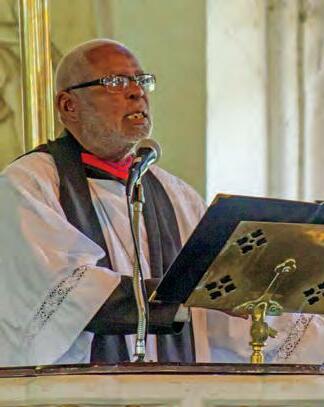
to social justice delivery in Trinidad and Tobago. Many thanks to the Right Reverend Claude Berkley; Reverend Dr. Knolly Clarke, Dean Emeritus; Reverend Father Carl Williams, Rector of the Cathedral; Brother Harrypersad Maharaj, President of the Inter-Religious Organisation; Johann Chuckaree; the Bishop Anstey High School Choir; Ms. Nakita Gadsby; Shiv Shakti Dancers, stakeholders and current and past members of staff for their support.
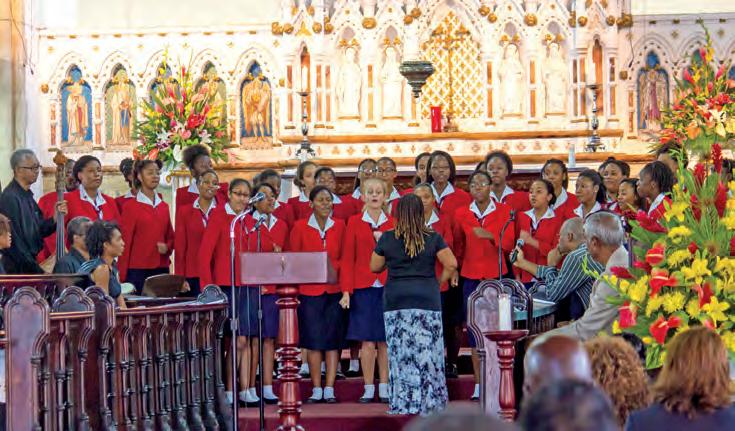

47 / ANNUAL REPORT 2014-2015
1) Former Speaker of the House of Representatives, the Honourable Wade Mark; former Minister of Labour and Small and Micro-Enterprise Development, the Honourable Errol McLeod; former President of the Senate, Senator the Honourable Raziah Ahmed and President of the Industrial Court, Her Honour Mrs. Deborah Thomas-Felix
2) Mr. Hamilton Johnson who is 91yrs is the oldest surviving former Judge of the Industrial Court
3) Reverend Dr. Knolly Clarke, Dean Emeritus
4) Performance by the Bishop Anstey High School Senior Choir
3 2 4

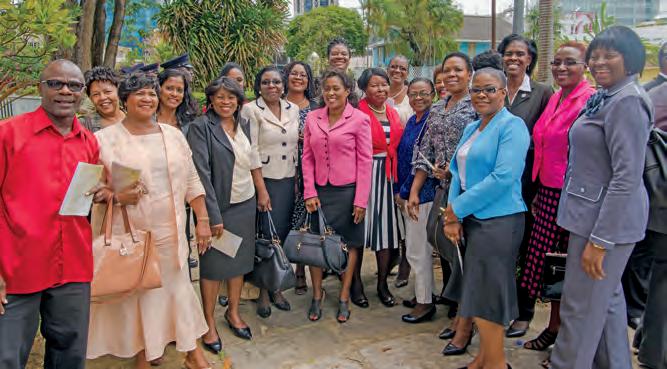
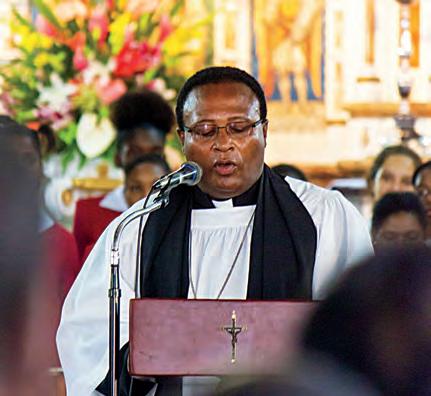



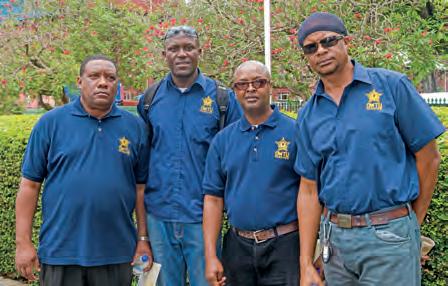 5) Reverend Father Carl Williams, Rector of the Trinity Cathedral
6) Some of the Judges of the Industrial Court
7) Brother Harrypersad Maharaj, President of the Inter-Religious Organisation
8 Shiv Shakti Dancers beautiful performance to ‘You Raise Me Up’
9) Members of the Oilfield Workers Trade Union
5) Reverend Father Carl Williams, Rector of the Trinity Cathedral
6) Some of the Judges of the Industrial Court
7) Brother Harrypersad Maharaj, President of the Inter-Religious Organisation
8 Shiv Shakti Dancers beautiful performance to ‘You Raise Me Up’
9) Members of the Oilfield Workers Trade Union
7 5 8 6 9 10 48 / INDUSTRIAL COURT OF TRINIDAD AND TOBAGO
10) Current and past Reporters of the Court
‘Meet With the Court” Symposium 3
The third ‘Meet With the Court’ Symposium, entitled “the Road to Social Justice”, formed part of this year’s 50th Anniversary celebrations and was held in May at the Hyatt Regency Trinidad, Port of Spain. The ‘Meet With the Court’ Symposium which was implemented in 2013, has become an important staple that our stakeholders eagerly look forward to each year. The key objective of this forum is to encourage all practitioners of industrial relations to engage in a social dialogue that will inform and improve the way in which they practice industrial relations in Trinidad and Tobago.

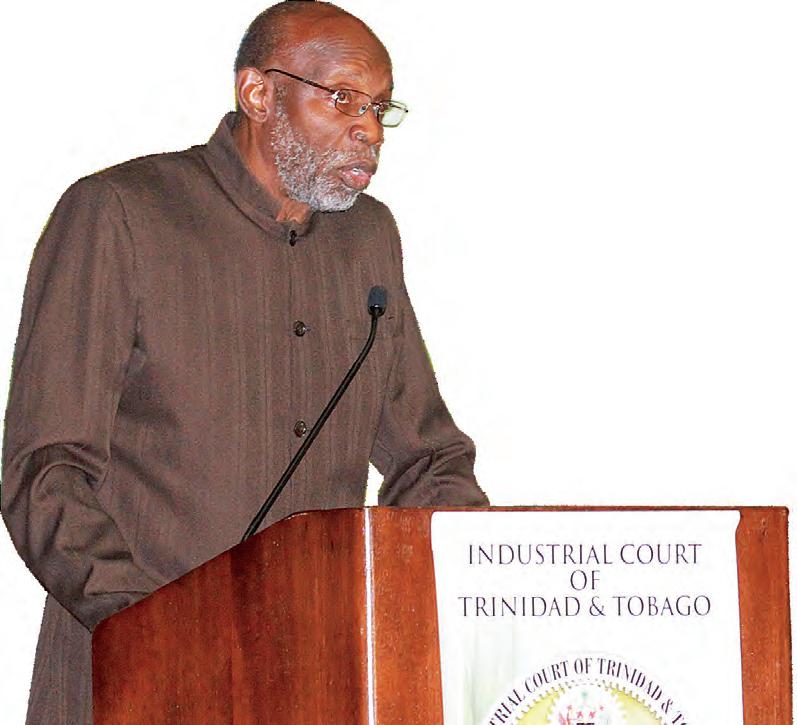
The Symposium engaged a cross section of the Court’s stakeholders in discussions on:
• The Impact of the Current Macroeconomic Environment on Industrial Relations and Wage Negotiations in Trinidad and Tobago and the wider Caribbean
• The Jurisprudence of the Industrial Court of Trinidad and Tobago
• Dismissal as the Ultimate Punishment

• Occupational Safety and Health in the context of Decent Work
• Occupational Safety and Health – Compliance and Enforcement
Among the speakers were economist Dr. Ralph Henry; Mr. Gaekwad Ramoutar, Chief Inspector, Occupational Safety and Health Authority; Mr. Rainer Pritzer Senior Specialist, Social Dialogue and Labour Administration, International Labour Organisation Decent Work Team and Office for the Caribbean, Dr. Leighton Jackson, Deputy Dean of Law at the University of the West Indies Mona Campus, and Mr. Jefferson Cumberbatch, Lecturer at the University of the West Indies, Cavehill Campus.
The Symposium also created an excellent platform to launch the Court’s 50th Anniversary historical magazine titled – ‘Journey to Gold -1965 to 2015’ and the inaugural ‘Trends in Labour and Industrial Relations’ bulletin which the Court intends to produce annually.
1) Dr. Ralph Henry, Economist
2) Her Honour Mrs. Deborah Thomas-Felix presents the Court’s 50th Anniversary Historical magazine to Dr. Majorie Thorpe, Chairman, Public Service Commission
3) Mr. Gaekwad Ramoutar and Mr. Rainer Pritzer

4) Ms. Sharon Chapman and Mr. Artie Harry

5) His Honour Mr. Anthony Gafoor, Chairman Tax Appeal Board and His Honour Mr. Rajmanlal Joseph, Chairman Equal Opportunity Tribunal
6) Dr. Leighton Jackson
7) Mr. Jefferson Cumberbatch
8) Mr. Seenath Jairam S.C., Senator the Honourable Mr. Elton Prescott S.C. and Mr. Gilbert Peterson S.C.

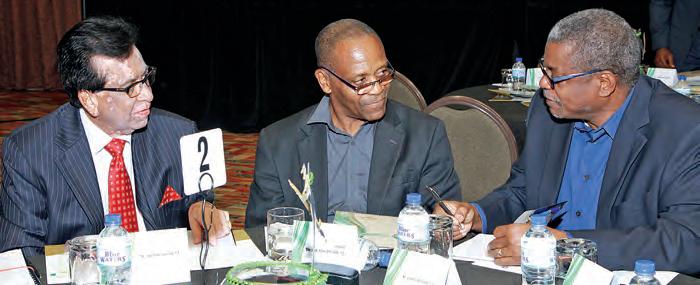

9) Senator the Honourable Mr. Anthony Vieira, His Honour Mr. Ramchand Lutchmedial and Mr. Keston Nancoo
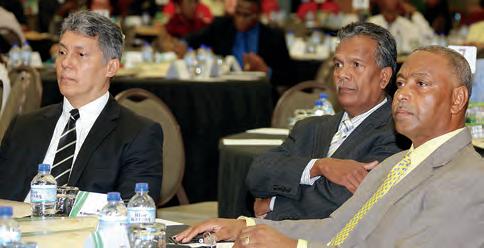



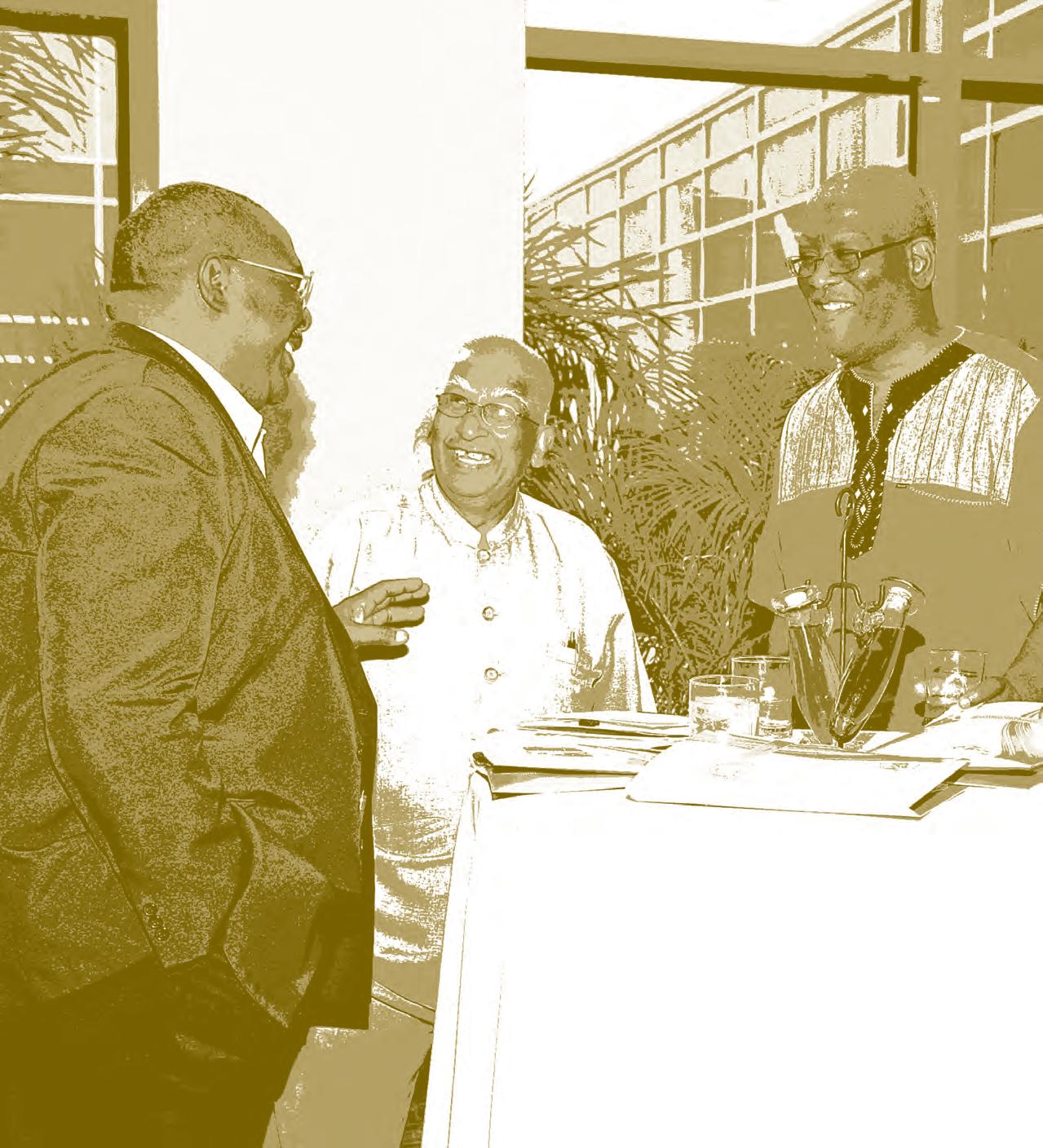
3 4 5 6 8
10)The Honourable Mr. Justice Vashiest Kokaram and Ms. Desiree Fraser, Labour Manager Tobago House of Assembly
9

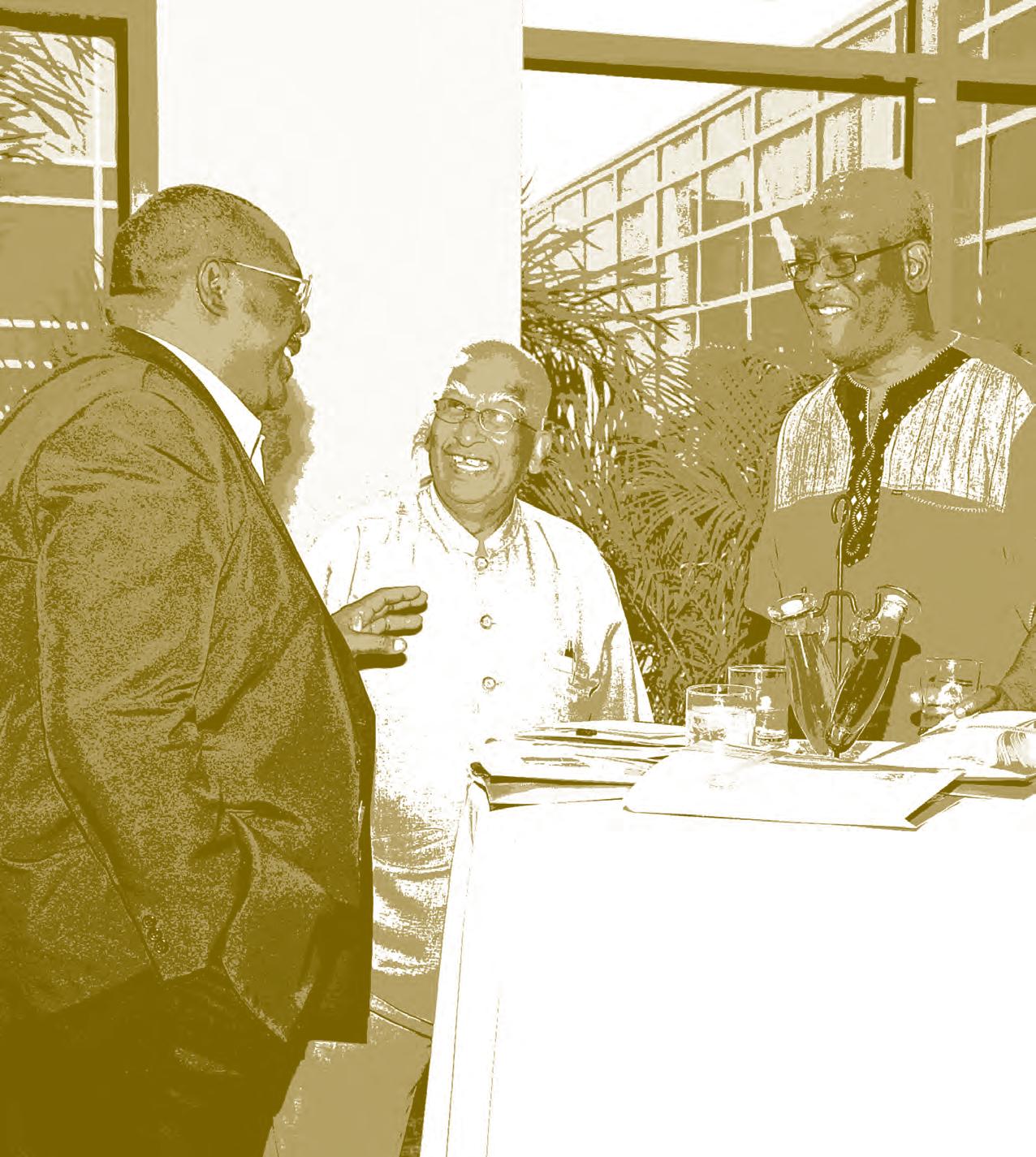

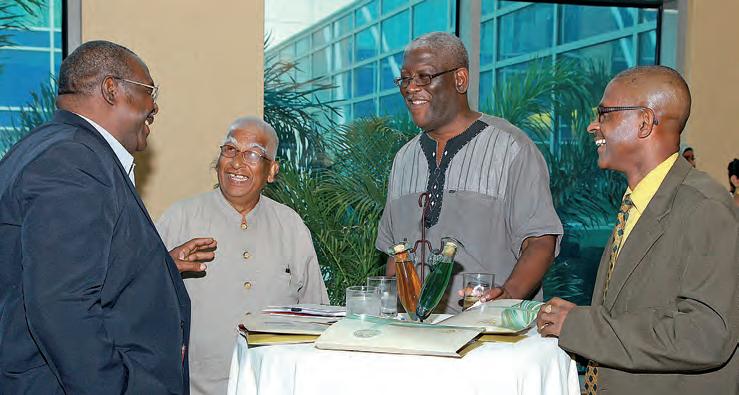

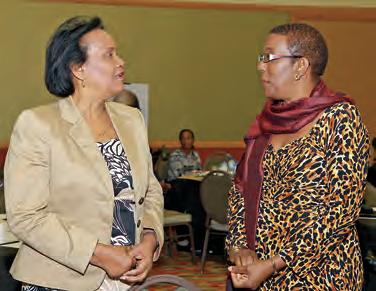
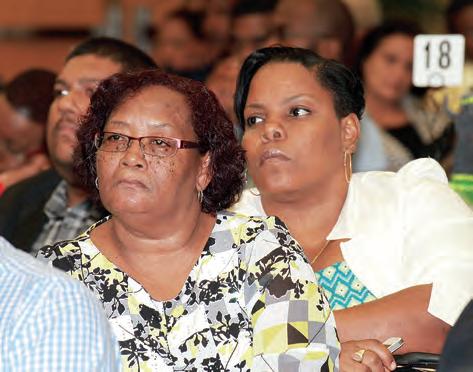 10) His Honour Dr. Selwyn Samaroo and His Honour Mr. Nizam Khan
11) Ms. Ida Le Blanc and Ms. Carla Walcott of the National Union for Domestic Workers
12) Ms. Ora Agarrat, Employee Relations Manager, First Citizens and Ms. Vernie Shields, General Manager Trinidad and Tobago Mortgage Finance
13) Mr. Bertrand Wilson, Mr. Krishna Deonarine, Mr. Michael Hunte, Mr. Gerard Antoine
10) His Honour Dr. Selwyn Samaroo and His Honour Mr. Nizam Khan
11) Ms. Ida Le Blanc and Ms. Carla Walcott of the National Union for Domestic Workers
12) Ms. Ora Agarrat, Employee Relations Manager, First Citizens and Ms. Vernie Shields, General Manager Trinidad and Tobago Mortgage Finance
13) Mr. Bertrand Wilson, Mr. Krishna Deonarine, Mr. Michael Hunte, Mr. Gerard Antoine
10 11 12 13 14 51 /
14) Staff of the Industrial Court
Annual Christmas Cocktails

The President of the Industrial Court once again heralded the Christmas Season by celebrating with stakeholders at the Annual Christmas Cocktail Reception held at Court in Port of Spain.



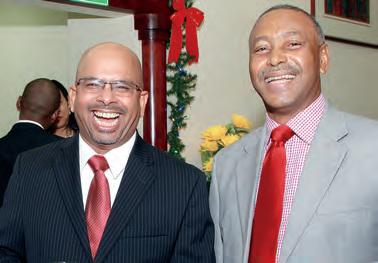
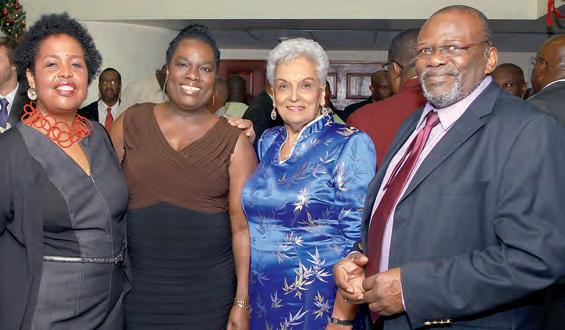

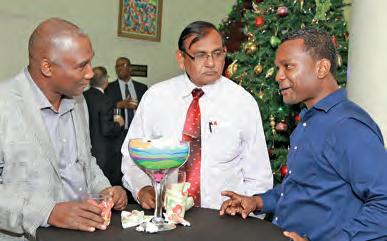 1) His Honour Mr Lawrence Achong, Former Minister of Labour Ms. Marlene Coudray, Her Honour
Mrs. Deborah Thomas-Felix
2) Ms. Sabina Gomez, Mr. Jamilah Juman, His Honour
Mr. Mahindra Maharaj and Ms. Nirupa Rai
3) Mr. Keith Johnson, Mr. Kawal Singh and Mr. Aaron Moynes
4) Mr. Derek Ali and Mr. Keston Nancoo
5) Ms. Jennifer Hudson-Phillip, Her Honour
Mrs. Deborah Thomas-Felix, Ms. Gladys Gafoor and Mr. Lennox Marcelle
6) His Honour Mr. Roger Jugmohan and Ms. Sherene Aziz
7) Mr. Achille Sebastien, Ms. Gene Francis, Ms. Karen Dhun, Mr. Krishna Bahadursingh and Mr. Roger Ramdwar
1) His Honour Mr Lawrence Achong, Former Minister of Labour Ms. Marlene Coudray, Her Honour
Mrs. Deborah Thomas-Felix
2) Ms. Sabina Gomez, Mr. Jamilah Juman, His Honour
Mr. Mahindra Maharaj and Ms. Nirupa Rai
3) Mr. Keith Johnson, Mr. Kawal Singh and Mr. Aaron Moynes
4) Mr. Derek Ali and Mr. Keston Nancoo
5) Ms. Jennifer Hudson-Phillip, Her Honour
Mrs. Deborah Thomas-Felix, Ms. Gladys Gafoor and Mr. Lennox Marcelle
6) His Honour Mr. Roger Jugmohan and Ms. Sherene Aziz
7) Mr. Achille Sebastien, Ms. Gene Francis, Ms. Karen Dhun, Mr. Krishna Bahadursingh and Mr. Roger Ramdwar
3 2 1 4 5 6 7
Staff Events


CHRISTMAS LIME
SPORTS AND FAMILY DAY
STAFF RETREAT
53 / ANNUAL REPORT 2014-2015
Christmas Lime

















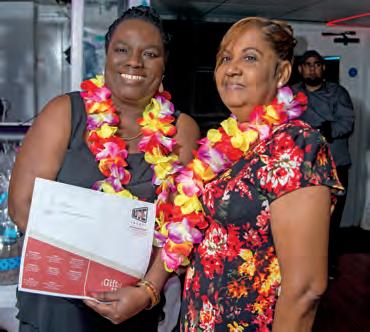






Sports and Family Day
























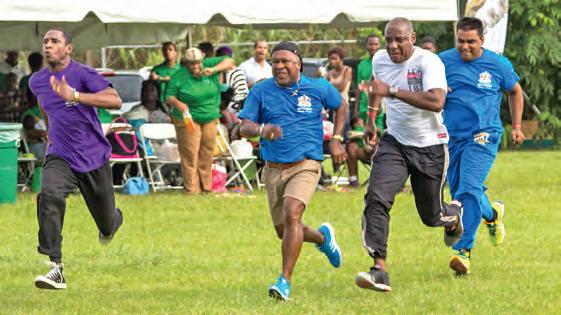






Staff Retreat

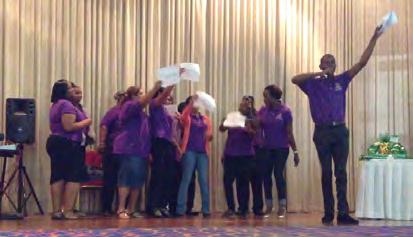


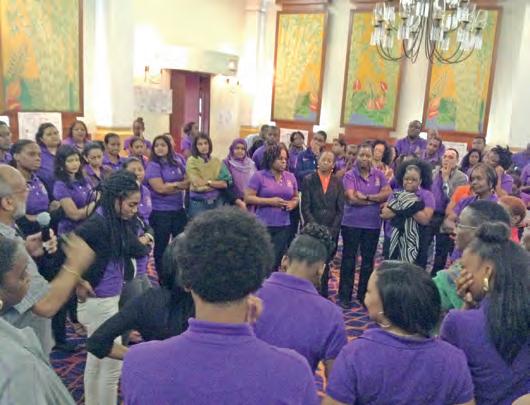
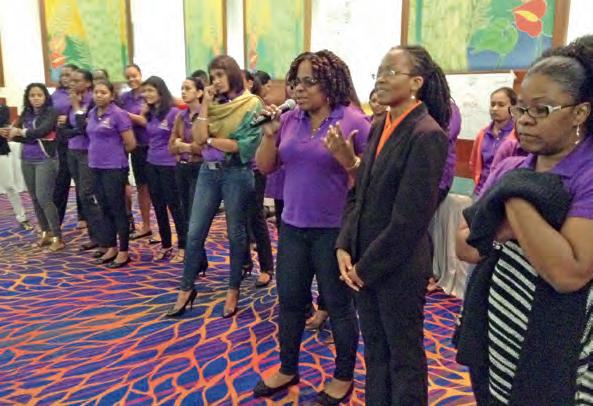


Appendices
Appendix A LIST OF ACRONYMS

Appendix B STATISTICS ON DISPUTES BEFORE THE COURT

Tables
Table 1.1 Number of Matters Filed - North (January 2014 – 14th September 2015)
Table 1.2 Number of Matters Filed – South (January 2014 –14th September 2015)
Table 1.3 Number of Matters Filed – North & South (January 2009 – 14th September 2015)
Table 2.1
Number of Matters Filed and Disposed – North (January 2014 – 14th September 2015)
Table 3.1 Number of Matters Disposed (January 2009 – 14th September 2015)
Table 4.1 Number of Matters Filed and Disposed – North (January 2006 – 14th September 2015)
Table 4.2 Number of Matters Filed and Disposed – South (January 2006 – 14th September 2015)
Table 4.3 Number of Matters Filed and Disposed – North & South (January 2006 – 14th September 2015)
Table 5 Percentage Increase Over the Periods 2010-2012 and 2013-2015
Table 6
Charts
Number of Judgments Delivered (January 2009 –14th September 2015)
Chart 1.1 Number of Matters Filed – North (January 2014 – 14th September 2015)
Chart 1.2 Number of Matters Filed – South (January 2014 – 14th September 2015)
Chart 1.3 Number of Matters Filed – North & South (January 2009- 14th September 2015)
Chart 2.1 Disposals – North (January 2014 – 14th September 2014)
Chart 2.2 Disposals – South (January 2014 – 14th September 2015)
Chart 3.1 Disposals – North (January 2009 – 14th September 2015)
Chart 3.2 Disposals – South (January 2009 – 14th September 2015)
Chart 3.3 Disposals – North & South ( January 2009 – 14th September 2015)
Chart 4.1 Total Matters Filed and Disposed – North & South (January 2009 – 14th September 2015)
Chart 4.2 Matters Settled by Conciliation – North and South (January 2009 - 14th September, 2015)
Chart 4.3 Total Matters Disposed by Category – North & South
Chart 5.1 Percentage Increase over the three (3) years for the period 2010-2012 and 2013 - 2015
Chart 5.2 Comparison of Matters Filed and Disposed for the periods 2010-2012 and 2013-2015
Chart 6.1 Judgments Delivered – North (January 2009 – 14th September 2015)
Chart 6.2 Judgments Delivered – South (January 2009 – 14th September 2015)
Chart 6.3 Judgments Delivered – North & South (January 2009 –14th September 2015)
Appendix C TRAINING AND DEVELOPMENT INITIATIVES
59 / ANNUAL REPORT 2014-2015
A
Appendix A
LIST OF ACRONYMS
Application
ESD Essential Ser vices Division

EX-PARTE Heard in the Absence of One Party of the Dispute
GSD General Services Division
ICA Interpretation of Collective Agreement
IRA Industrial Relations Act
IRO Industrial Relations Offence
MPD Maternity Protection Dispute
MWD Minimum Wages Dispute
O Opinion
OSHA Occupational Safety and Health Act
OSHD Occupational Safety and Health Dispute
PF Peremptory Fixture
R Recognition
RC Rescission of Contract
RSBD Retrenchment and Severance Benefits Dispute
ST Special Tribunal
TD Trade Dispute
WOP Want of Prosecution
60 / INDUSTRIAL COURT OF TRINIDAD AND TOBAGO
Appendix B

STATISTICS ON DISPUTES BEFORE THE COURT
The Industrial Court of Trinidad and Tobago over the last fifty (50) years has been fulfilling its mandate to provide just, equitable and expeditious disposal of matters. Disputes are disposed of in the following manner:
• By way of settlement by Conciliation
• At the conclusion of bilateral talks the parties settled the dispute and wish to withdraw it
• A terms of settlement is filed with the Court
• Judgment of the Court
• Orders of the Court dismissing the dispute for want of prosecution (the complaining Party did not file or did not appear in Court for the Case Management Conference or at the Hearing)
The statistical analysis in this review is for the period 2009 to 14th September, 2015. These statistics include disputes filed in both North and South branches of the Court; the disputes which have been determined in Tobago are included in the North statistics. These statistics speak to:
• the number of matters filed with the Court for the years 2014 to 2015;
• the number of disputes filed and disposed of (disposal include matters from previous years);
• the number of judgments delivered from 2009 to 2015 (as at September 14, 2015); and
• the number of matters settled by conciliation in the year under review (as at September 14, 2015).
The statistics show that during the period 2010 to 2012 the total number of disputes filed and disposed of were 2594 and 1443, respectively. Whereas for the period 2013 to 2015 the total number of dispute filed and disposed of were 2384 and 2089, respectively. This represented a decrease of eight percent (8%) in disputes filed and fortyfive percent (45%) increase of disputes disposed. The table and charts also show an increase in the number of disputes
settled bilaterally, either by consent orders or by terms of settlement. There was also an increase in the number of matters withdrawn. This indicates that parties are accepting the conciliatory approach which is advanced by the Court. We are mindful that parties in the work environment share a common interest and to this end we have been encouraging parties to utilise the conciliatory approach to problem solving and conflict resolution. To date, all the Members of the Court including the Registrars have been trained in “Conciliation/Mediation” by the International Labour Organisation, International Training Centre.
61 / ANNUAL REPORT 2014-2015
Table 1.1: NUMBER OF MATTERS FILED Industrial Court of Trinidad and Tobago, North Court For the period January 2014 - 14th September 2015

62 / INDUSTRIAL COURT OF TRINIDAD AND TOBAGO
YEAR MONTH TRADE ICA IRO A R RC O RSBD MWD MPD OSHA ESD ESD ESD ESD ST ST A ST ST TO TAL DISPUTES ICA IRO A ICA IRO FILED MATTERS FILED 2014 2015 JANUARY 62 1 1 1-2 12-8 2-80 FEBURARY 612-4--2 2-71 MARCH 463-21-4 1-57 APRIL 57 2 3-2--2 1-67 MAY 74 1 2 2-1-15-86 JUNE 341-2 1--10 1-49 JULY 771 3-11210 3-98 AUGUST 34--31-7 3-48 SEPTEMBER 39--2 1-22 3-67 OCTOBER 44 1 1-1--6 10-63 NOVEMBER 31 1 3-3--13-51 DECEMBER 26--2--1-29 TOTAL 585 6 16 7 0 0 0 24 4 0 5 0 3 0 90 26 0 0 0 766 JANUA RY 17 1 6---3-8 1-36 FEBURARY 62-11-6-16 MARCH 394-11-3 3-51 APRIL 513---2-5 1-62 MAY 503---1-1-55 JUNE 36 1 3-13-6 3-53 JULY 483---2-2 1-56 AUGUST 69------1 1-71 SEPTEMBER 9------1-10 OCTOBER NOVEMBER DECEMB ER TOTAL 325 2 24 0 0 0 0 3 0 0 13 0 0 0 32 11 0 0 0 410
Source: Registry Department of the Industrial Court of Trinidad & Tobago
Chart 1.1: MATTERS FILED
Industrial Court of Trinidad and Tobago, North Court For the period January 2014 - 14th September 2015

63 / ANNUAL REPORT 2014-2015
600 500 400 300 200 100 0 TRADEDISPUTES ICA A R RC O RSBD MWD MPD OSHA ESDICA ESDIRO ESDA ESD ST STA STICA IRO STIRO Statistics for 2015 include figures as at 14th September, 2015 only 2014 2015
period January 2014 - 14th September 2015

64 / INDUSTRIAL COURT OF TRINIDAD AND TOBAGO
YEAR MONTH TRADE ICA IRO A R RC O RSBD MWD MPD OSHA ESD ESD ESD ESD ST ST A ST ST TO TAL DISPUTES ICA IRO A ICA IRO FILED MATTERS FILED 2014 2015 JANUARY 6--------6 FEBURARY 9--------9 MARCH 321-------33 APRIL 27--------27 MAY---------0 JUNE 81-1-11-12 JULY 3--------3 AUGUST 5------1-6 SEPTEMBER 6--------6 OCTOBER 7--------7 NOVEMBER 11--1-----12 DECEMBER 7--------7 TOT AL 121 0 1 1 0 0 0 2 0 0 0 0 1 0 0 2 0 0 0 128 JAN UARY 3 1--------4 FEBURARY 3-----2--5 MARCH 12----1---13 APRIL 3------2-5 MAY 14--------14 JUNE 5--------5 JULY 15--------15 AUGUST 16--------16 SEPTEMBER OCTOBER NOVEMBER DECEMBER TOTAL 71 1 0 0 0 0 0 0 0 0 1 0 2 0 2 0 0 0 0 77 *With effect from October 2012 ESD matters are now heard in the South Court of the Industrial Court of T&T
Registry Department of the Industrial Court of Trinidad & Tobago
Table 1.2: NUMBER OF MATTERS FILED Industrial Court of Trinidad and Tobago, South Court For the
Source:
Chart 1.2: MATTERS FILED
Industrial Court of Trinidad and Tobago, South Court For

65 / ANNUAL REPORT 2014-2015
January 2014
2015 140 120 100 80 60 40 20 0 TRADEDISPUTES ICA A R RC O RSBD MWD MPD OSHA ESDICA ESDIRO ESDA ESD* ST STA STICA IRO STIRO Statistics for 2015 include figures as at 14th September, 2015 only 2014 2015
the period
- 14th September

66 / INDUSTRIAL COURT OF TRINIDAD AND TOBAGO 900 800 700 600 500 400 300 200 100 0 2009 2010 2011 2012 2013 2014 2015 P 606 Chart 1.3: MATTERS FILED Industrial Court of Trinidad and Tobago, North & South Court For the period January 2009 - 14th September 2015 86 669 112 785 93 883 891 128 766 112 102 77 410
2015
at 14th September, 2015
YEAR MATTERS YEAR MATTERS YEAR MATTERS FILED FILED FILED NORTH SOUTH NORTH & SOUTH Table 1.3: NUMBER OF MATTERS FILED Industrial Court of Trinidad and Tobago For the period January 2009 - 14th September 2015 2009 606 2009 86 2009 692 2010 669 2010 112 2010 781 2011 785 2011 93 2011 878 2012 833 2012 102 2012 935 2013 891 2013 112 2013 1003 2014 766 2014 128 2014 894 2015P 410 2015P 77 2015P 487
NORTH SOUTH
Statistics for
include figures as
only
P - This represents a Provisional figure

67 / ANNUAL REPORT 2014-2015
JANUARY 81 16 15 9 18 4 62 FEBURARY 71 9 11 10 25 7 62 MARCH 57 7 16 7 24 3 57 APRIL 67 39 7 9 18 1 74 MAY 86 17 16 23 26 2 84 JUNE 49 14 10 15 27 2 68 JULY 98 31 11 12 17 - 71 AUGUST 48 5 4 2 21 - 32 SEPTEMBER 67 11 17 5 14 - 47 OCTOBER 63 11 7 18 17 - 53 NOVEMBER 51 14 10 10 38 3 75 DECEMBER 29 5 4 5 9 - 23 TOTAL 767 179 128 125 254 22 708 JANUARY 36 20 18 8 22 1 69 FEBURARY 16 7 16 10 13 3 49 MARCH 51 13 13 14 50 1 91 APRIL 62 8 19 15 17 2 61 MAY 55 8 12 8 24 - 52 JUNE 53 13 8 11 14 - 46 JULY 56 24 4 9 20 - 57 AUGUST 71 11 5 1 6 2 26 SEPTEMBER 10 - - - - -OCTOBER NOVEMBER DECEMBER TOTAL 410 104 95 76 166 9 450 2014 2015 * Statistics for 2015 include figures as at 14th September, 2015 only YEAR MONTH TOTAL JUDGMENTS MATTERS MATTERS MATTERS MATTERS TOTAL FILED DELIVERED DISPOSED DISPOSED IN WITHDRAWN DISMISSED / MATTERS BILATERALLY CONCILIATION W.O.P DISPOSED Consent Order/ Terms of Settlement MATTERS SETTLED
Table 2.1: NUMBER OF MATTERS FILED AND DISPOSED (E.S.D. & G.S.D.) Industrial Court of Trinidad and Tobago, North Court For the period January 2014 - 14th September 2015

68 / INDUSTRIAL COURT OF TRINIDAD AND TOBAGO
YEAR MONTH TOTAL JUDGMENTS MATTERS MATTERS MATTERS MATTERS TOTAL FILED DELIVERED DISPOSED DISPOSED IN WITHDRAWN DISMISSED / MATTERS BILATERALLY CONCILIATION W.O.P DISPOSED Consent Order/ Terms of Settlement MATTERS SETTLED JANUARY 6 - - - 5 1 6 FEBURARY 9 - 2 - 6 - 8 MARCH 33 - 5 - 4 - 9 APRIL 27 1 2 - 1 2 6 MAY 0 - 3 - 2 - 5 JUNE 12 - 1 - - - 1 JULY 3 1 3 - 2 - 6 AUGUST 6 1 - - - - 1 SEPTEMBER 6 - - - - - 0 OCTOBER 7 - 1 - 3 - 4 NOVEMBER 12 8 1 - 2 - 11 DECEMBER 7 2 10 - - - 12 TOTAL 128 13 28 0 25 3 69 JANUARY 4 1 2 4 1 - 12 FEBURARY 5 3 1 - 1 - 10 MARCH 13 2 3 - 2 - 20 APRIL 5 2 1 1 3 - 12 MAY 14 - 5 - 1 - 20 JUNE 5 3 3 - 1 - 12 JULY 15 2 2 - 6 - 25 AUGUST 16 - - 1 1 - 18 SEPTEMBER OCTOBER NOVEMBER DECEMBER TOTAL 77 13 17 6 16 0 52 2014 2015 * Statistics for 2015 include figures as at 14th September, 2015 only
Table 2.2: NUMBER OF MATTERS FILED AND DISPOSED (E.S.D. & G.S.D.) Industrial Court of Trinidad and Tobago, South Court For the period January 2014 - 14th September 2015
Chart 2.1: DISPOSALS
Industrial Court of Trinidad and Tobago, North Court
For the period January 2014 - 14th September 2015
Statistics for 2015 include figures as at 14th September, 2015 only
Chart 2.2: DISPOSALS
Industrial Court of Trinidad and Tobago, South Court
For the period January 2014 - 14th September 2015
2014 2015*
Judgments Matters Disposed Matters Matters Withdrawn Matters Dismissed Delivered Bilaterally Disposed W.O.P (Consent Order/ in Terms of Conciliation Settlement)
2014 2015*
Statistics for 2015 include figures as at 14th September, 2015 only

69 / ANNUAL REPORT 2014-2015
30 25 20 15 10 5 0
300 250 200 150 100 50 0
Judgments Matters Disposed Matters Matters Withdrawn Matters Dismissed Delivered Bilaterally Disposed W.O.P (Consent Order/ in Terms of Conciliation Settlement)
Chart

70 / INDUSTRIAL COURT OF TRINIDAD AND TOBAGO YEAR MATTERS YEAR MATTERS YEAR MATTERS DISPOSED DISPOSED DISPOSED NORTH SOUTH NORTH & SOUTH
Industrial Court of Trinidad
For the period January 2009 - 14th September 2015 2009 370 2009 35 2009 405 2010 386 2010 55 2010 441 2011 345 2011 86 2011 431 2012 501 2012 70 2012 571 2013 729 2013 81 2013 810 2014 708 2014 69 2014 777 2015P 450 2015P 52 2015P 502 P - This represents a Provisional figure 800 700 600 500 400 300 200 100 0
Table 3.1: NUMBER OF MATTERS DISPOSED
and Tobago
the period January 2009 - 14th September 2015 Statistics for 2015 include figures as at 14th September, 2015 only 2009 2010 2011 2012 2013 2014 2015P 370 386 345 501 729 708 450
3.1: DISPOSALS Industrial Court of Trinidad and Tobago, North Court For
Chart 3.2: DISPOSALS
Industrial Court of Trinidad and Tobago, South Court
For the period January 2009 - 14th September 2015
Chart 3.3: DISPOSALS

71 / ANNUAL REPORT 2014-2015
100 90 80 70 60 50 40 30 20 10 0 Statistics for 2015 include figures as at 14th September, 2015 only 2009 2010 2011 2012 2013 2014 2015P 35 55 86 70 81 69 52 900 800 700 600 500 400 300 200 100 0
the period January
September
Statistics for 2015 include figures as at 14th September, 2015 only 2009 2010 2011 2012 2013 2014 2015P 405 441 431 571 810 777 502
Industrial Court of Trinidad and Tobago, North & South Court
For
2009 - 14th
2015

72 / INDUSTRIAL COURT OF TRINIDAD AND TOBAGO
Industrial Court
For the period January 2006
September
MATTERS SETTLED 2006 656 100 97 36 63 36 332 2007 481 212 117 83 258 27 697 2008 560 163 91 59 150 31 494 2009 692 119 94 83 94 15 405 2010 781 146 64 85 122 24 441 2011 878 160 54 93 121 3 431 2012 935 203 115 35 188 30 571 2013 1003 196 160 163 249 42 810 2014 894 192 156 125 279 25 777 2015P 487 117 112 82 182 9 502 YEAR TOTAL JUDGMENTS MATTERS MATTERS MATTERS MATTERS TOTAL FILED DELIVERED DISPOSED DISPOSED IN WITHDRAWN DISMISSED / MATTERS BILATERALLY CONCILIATION W.O.P DISPOSED (Consent Order/ Terms of Settlement NB : The figures for 2015 is provisional 1200 1000 800 600 400 200 0 2009 2010 2011 2012 2013 2014 2015P
Industrial Court of Trinidad and Tobago,
& South Court For the period January 2009 - 14th September 2015 692 781 441 878 431 935 1003 777 894 810 571 502 487 Statistics for 2015 include figures as at 14th September, 2015 only 405 TOTAL FILED TOTAL MATTERS DISPOSED
Table 4: NUMBER OF MATTERS FILED AND DISPOSED (E.S.D. & G.S.D.)
of Trinidad and Tobago, North & South Court
- 14th
2015
Chart 4.1: TOTAL MATTERS FILED AND DISPOSED
North
Matters Withdrawn 36%
Matters Dismissed/ W.O.P 4%

Matters Disposed Bilaterally (Consent Order/ Terms of Settlement 22%
Matters Disposed in Conciliation 17%
Statistics for 2015 include figures as at 14th September, 2015 only
73 / ANNUAL REPORT 2014-2015 180 160 140 120 100 80 60 40 20 0
the period January 2009 - 14th September 2015 Statistics for 2015 include figures as at 14th September, 2015 only 2009 2010 2011 2012 2013 2014 2015P 83 85 93 35 163 125 82
Chart 4.2: MATTERS SETTLED BY
CONCILIATION Industrial Court of Trinidad and Tobago, North & South Court For
South
at 14th September
Chart 4.3: TOTAL MATTERS DISPOSED BY CATEGORY Industrial Court of Trinidad and Tobago, North
&
Court As
2015
Judgments
Delivered 23%
Chart
INCREASE OVER THE THREE (3) YEARS
Court of Trinidad and Tobago
the period 2010-2012 and 2013-2015
Statistics for 2015 include figures as at 14th September, 2015 only

74 / INDUSTRIAL COURT OF TRINIDAD AND TOBAGO DISPOSAL 2010 - 2012 2594 509 233 213 431 57 1443 2013 - 2015 2384 505 428 370 710 76 2089 % INCREASE 8.10 0.79 83.69 73.71 64.73 33.33 44.77 PERIOD DISPUTES JUDGMENTS MATTERS MATTERS MATTERS MATTERS TOTAL FILED DELIVERED DISPOSED DISPOSED IN WITHDRAWN DISMISSED/ MATTERS BILATERALLY CONCILIATION W.O.P DISPOSED Consent Order/ Terms of Settlement
100.00 80.00 60.00 40.00 20.00 0.00 20.00
Table 5: PERCENTAGE INCREASE Over the Periods 2010-2012 and 2013-2015
Total Files Judgments Matters Disposed Matters Matters Matters Delivered Delivered Bilaterally Disposed Withdrawn Dismissed/ (Consent Order/ in Conciliation W.O.P Terms of Settlement) 8.10 .79 83.69 73.71 64.73 33.33
5.1: PERCENTAGE
Industrial
For
Chart 5.2: COMPARISON OF MATTERS FILED AND DISPOSED Industrial Court of Trinidad and Tobago For the periods
2010-2012 and 2013-2015
Statistics for 2015 include figures as at 14th September, 2015 only

75 / ANNUAL REPORT 2014-2015 3000 2500 2000 1500 1000 500 0
Total Files Judgments Matters Matters Matters Matters Total Delivered Delivered Disposed Disposed Withdrawn Dismissed/ Matters Bilaterally in W.O.P Disposed (Consent Order/ Conciliation Terms of Settlement) 2010-2012 2013-2015

76 / INDUSTRIAL COURT OF TRINIDAD AND TOBAGO
Industrial Court of Trinidad and Tobago, North Court For the period January 2009 - 14th September 2015 Statistics for 2015 include figures as at 14th September, 2015 only 2009 2010 2011 2012 2013 2014 2015P 200 180 160 140 120 100 80 60 40 20 0 109 123 132 190 175 179 104 YEAR JUDGMENT YEAR JUDGMENT YEAR JUDGMENT DELIVERED DELIVERED DELIVERED NORTH SOUTH NORTH & SOUTH
NUMBER
Industrial Court of Trinidad and Tobago For the period January 2009 - 14th September 2015 2009 109 2009 10 2009 119 2010 123 2010 23 2010 146 2011 132 2011 28 2011 160 2012 190 2012 13 2012 203 2013 175 2013 21 2013 196 2014 179 2014 13 2014 192 2015P 104 2015P 13 2015P 117
-
represents a Provisional figure
Chart 6.1: JUDGMENTS DELIVERED
Table 6:
OF JUDGMENTS DELIVERED
P
This

77 / ANNUAL REPORT 2014-2015 30 35 20 15 10 5 0
DELIVERED Industrial
For
September
Statistics for 2015 include figures as at 14th September, 2015 only 2009 2010 2011 2012 2013 2014 2015P 10 23 28 13 21 13 13 250 200 150 100 50 0
Industrial
For the period
2009
14th September
Statistics for 2015 include figures as at 14th September, 2015 only 2009 2010 2011 2012 2013 2014 2015P 119 146 160 203 196 192 117
Chart 6.2: JUDGMENTS
Court of Trinidad and Tobago, South Court
the period January 2009 - 14th
2015
Chart 6.3: JUDGMENTS DELIVERED
Court of Trinidad and Tobago, North & South Court
January
-
2015
Appendix C
TRAINING AND DEVELOPMENT INITIATIVES
OctOber, 2014 – September, 2015
Machine Shorthand
September–December, 2014
Written Shorthand
Operational Auditing
Machine Shorthand
September–December, 2014

November 18, 2014
January–March, 2015
Written Shorthand
Public Sector Standards
… Auditors
“IT Auditing for Non-IT Auditors”
Judicial Writing
Machine Shorthand
January–March, 2015
April 22 & 24, 2015
April 23 & 24, 2015
April 27–May 01, 2015
April–July, 2015
Written Shorthand
Coaching and Monitoring
Conciliation Training
April–July, 2015
May 19–21, 2015
September 9–11, 2015
Clerk/Stenographers Typists Auditing
Verbatim Reporters
Clerk/Stenographers Typists
Clerk/Stenographers
Typists
Auditor I Auditing Assistant Judges
Verbatim Reporters
Clerk/Stenographers
Typists
Clerk/Stenographers
Typists
Director, Office of Economic and Industrial Research Judges
Ministry of Public Administration
Ministry of Public Administration
National Judicial College, Reno, Nevada
Paul’s Secretarial College
Paul’s Secretarial College
Ministry of Public Administration
International Labour Organisation Decent Work Team Office for the Caribbean
78 / INDUSTRIAL COURT OF TRINIDAD AND TOBAGO Name of Training Training Period Target Number Training Provider Trained 8 4 1 6 3 1 1 2 6 3 1 25 Paul’s Secretarial College Paul’s Secretarial College
Institute
Secretarial College
The
of Internal Auditors, Trinidad & Tobago Chapter Paul’s
Paul’s Secretarial College
Verbatim Reporters Clerk/Stenographers Typists
Assistant
March 18–20, 2015
I.L.O. Conference
May 31–June 11, 2015
The Caribbean Association of Law Libraries (CARALL)
30th Annual Conference
National Association of Court Management Annual Conference
National Court Reporters’ Association Annual Convention
June 29–July 02, 2015
President Registrar President Judge
International Labour Organisation, Geneva, Switzerland
July 12–16, 2015
Librarian III Librarian I Assistant Registrar Court Administrator
July 30–August 02, 2015
Senior CAT Reporter Verbatim Reporter I

CARALL, Barbados
National Association of Court Management
National Court Reporters’ Association
79 / ANNUAL REPORT 2014-2015
Period Target Attendees Provider 2 1 2 2 2
Conferences
The Administrative Tribunal of the Council of Europe, Strasbourg, France
The International Colloquy
CONFERENCES Appendix C
50 Years of Social Justice Delivery


1965
2015
PORT OF SPAIN
Industrial Court Building
Cor. Queen and St. Vincent Streets
Port of Spain
Trinidad and Tobago, W.I.
Telephone: 1 (868) 623-1304-8
Facsimile: 1 (868) 623-6179
SAN FERNANDO
Industrial Court Building
6 Irving Street (North)
San Fernando
Trinidad and Tobago, W.I.
Telephone: 1 (868) 653-5182 / 0652
1 (868) 652-7321/ 8910
Facsimile: 1 (868) 657-0965

www.industrialcourt.org.tt
A publication of the Industrial Court of Trinidad and Tobago.
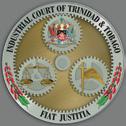








































































 5) Reverend Father Carl Williams, Rector of the Trinity Cathedral
6) Some of the Judges of the Industrial Court
7) Brother Harrypersad Maharaj, President of the Inter-Religious Organisation
8 Shiv Shakti Dancers beautiful performance to ‘You Raise Me Up’
9) Members of the Oilfield Workers Trade Union
5) Reverend Father Carl Williams, Rector of the Trinity Cathedral
6) Some of the Judges of the Industrial Court
7) Brother Harrypersad Maharaj, President of the Inter-Religious Organisation
8 Shiv Shakti Dancers beautiful performance to ‘You Raise Me Up’
9) Members of the Oilfield Workers Trade Union
















 10) His Honour Dr. Selwyn Samaroo and His Honour Mr. Nizam Khan
11) Ms. Ida Le Blanc and Ms. Carla Walcott of the National Union for Domestic Workers
12) Ms. Ora Agarrat, Employee Relations Manager, First Citizens and Ms. Vernie Shields, General Manager Trinidad and Tobago Mortgage Finance
13) Mr. Bertrand Wilson, Mr. Krishna Deonarine, Mr. Michael Hunte, Mr. Gerard Antoine
10) His Honour Dr. Selwyn Samaroo and His Honour Mr. Nizam Khan
11) Ms. Ida Le Blanc and Ms. Carla Walcott of the National Union for Domestic Workers
12) Ms. Ora Agarrat, Employee Relations Manager, First Citizens and Ms. Vernie Shields, General Manager Trinidad and Tobago Mortgage Finance
13) Mr. Bertrand Wilson, Mr. Krishna Deonarine, Mr. Michael Hunte, Mr. Gerard Antoine






 1) His Honour Mr Lawrence Achong, Former Minister of Labour Ms. Marlene Coudray, Her Honour
Mrs. Deborah Thomas-Felix
2) Ms. Sabina Gomez, Mr. Jamilah Juman, His Honour
Mr. Mahindra Maharaj and Ms. Nirupa Rai
3) Mr. Keith Johnson, Mr. Kawal Singh and Mr. Aaron Moynes
4) Mr. Derek Ali and Mr. Keston Nancoo
5) Ms. Jennifer Hudson-Phillip, Her Honour
Mrs. Deborah Thomas-Felix, Ms. Gladys Gafoor and Mr. Lennox Marcelle
6) His Honour Mr. Roger Jugmohan and Ms. Sherene Aziz
7) Mr. Achille Sebastien, Ms. Gene Francis, Ms. Karen Dhun, Mr. Krishna Bahadursingh and Mr. Roger Ramdwar
1) His Honour Mr Lawrence Achong, Former Minister of Labour Ms. Marlene Coudray, Her Honour
Mrs. Deborah Thomas-Felix
2) Ms. Sabina Gomez, Mr. Jamilah Juman, His Honour
Mr. Mahindra Maharaj and Ms. Nirupa Rai
3) Mr. Keith Johnson, Mr. Kawal Singh and Mr. Aaron Moynes
4) Mr. Derek Ali and Mr. Keston Nancoo
5) Ms. Jennifer Hudson-Phillip, Her Honour
Mrs. Deborah Thomas-Felix, Ms. Gladys Gafoor and Mr. Lennox Marcelle
6) His Honour Mr. Roger Jugmohan and Ms. Sherene Aziz
7) Mr. Achille Sebastien, Ms. Gene Francis, Ms. Karen Dhun, Mr. Krishna Bahadursingh and Mr. Roger Ramdwar































































